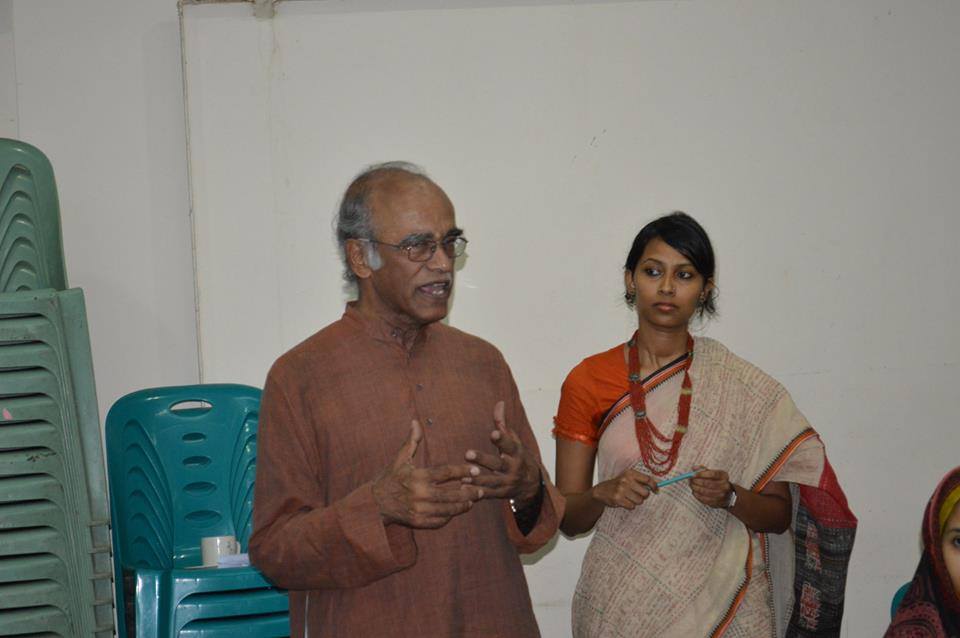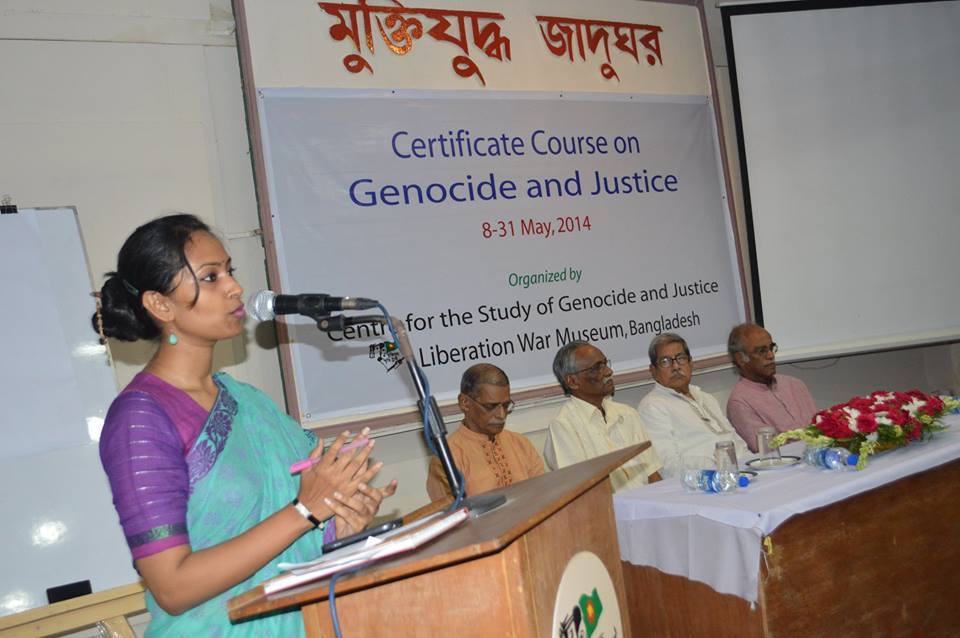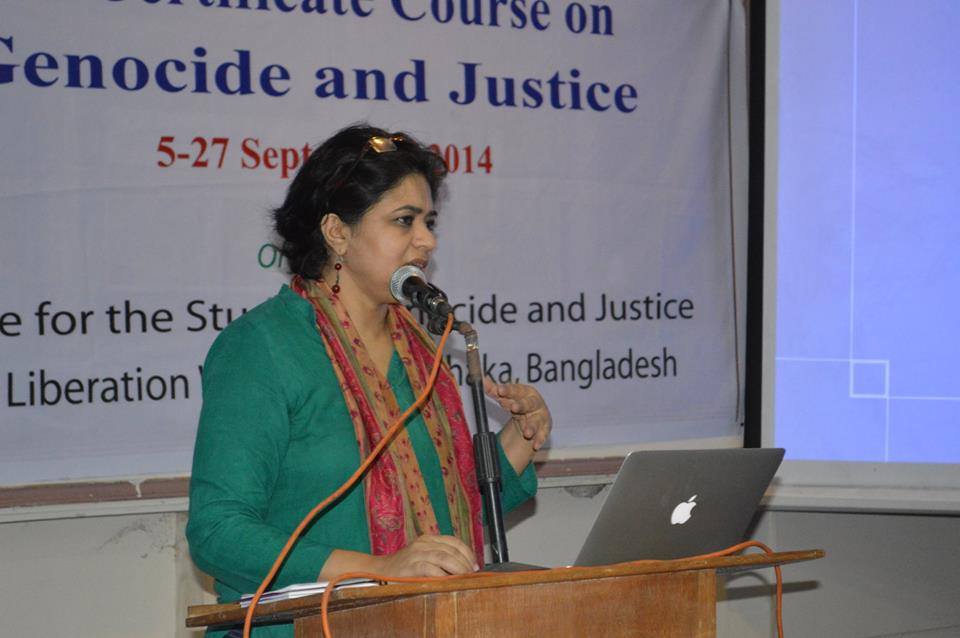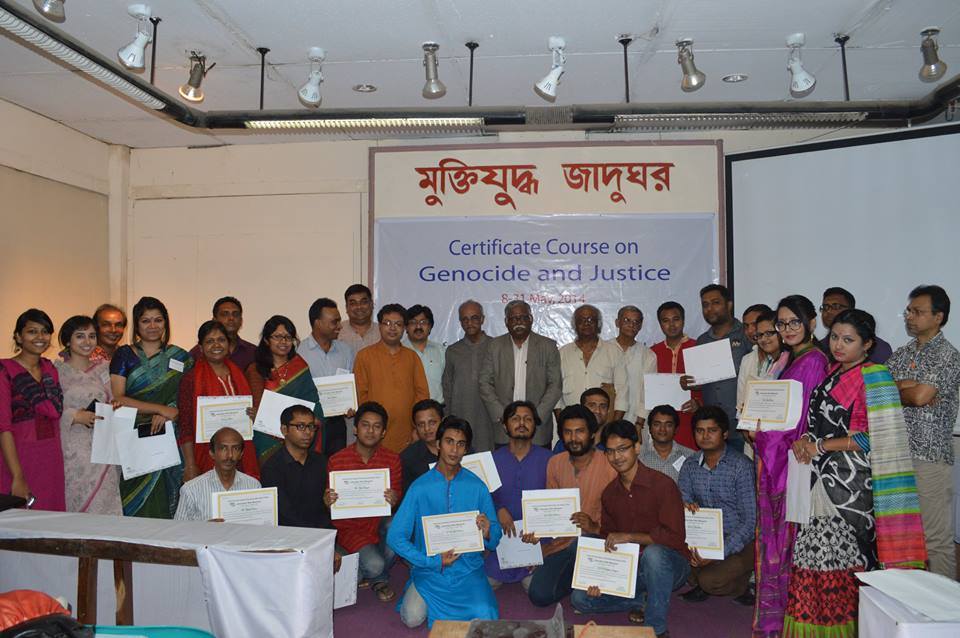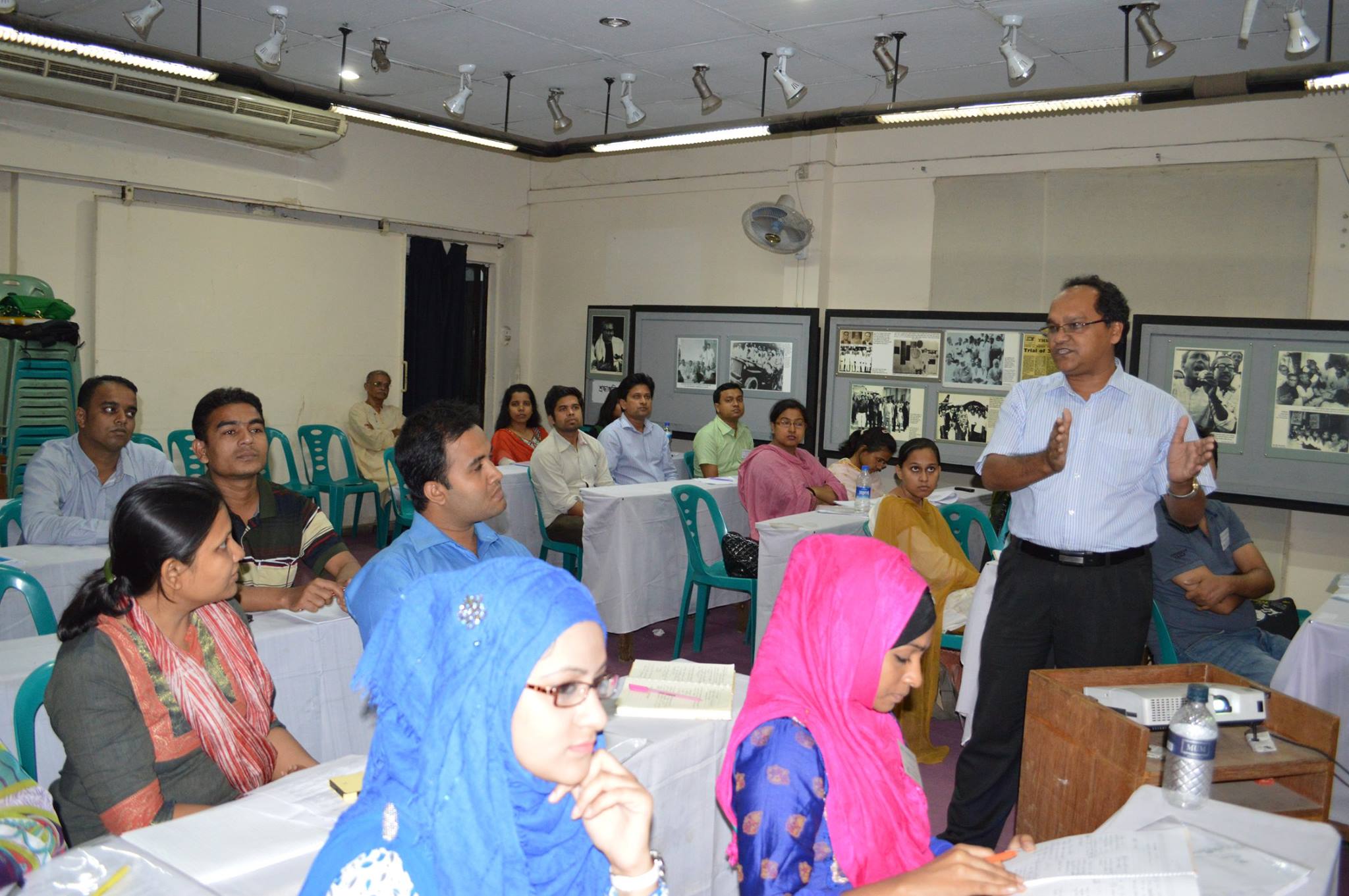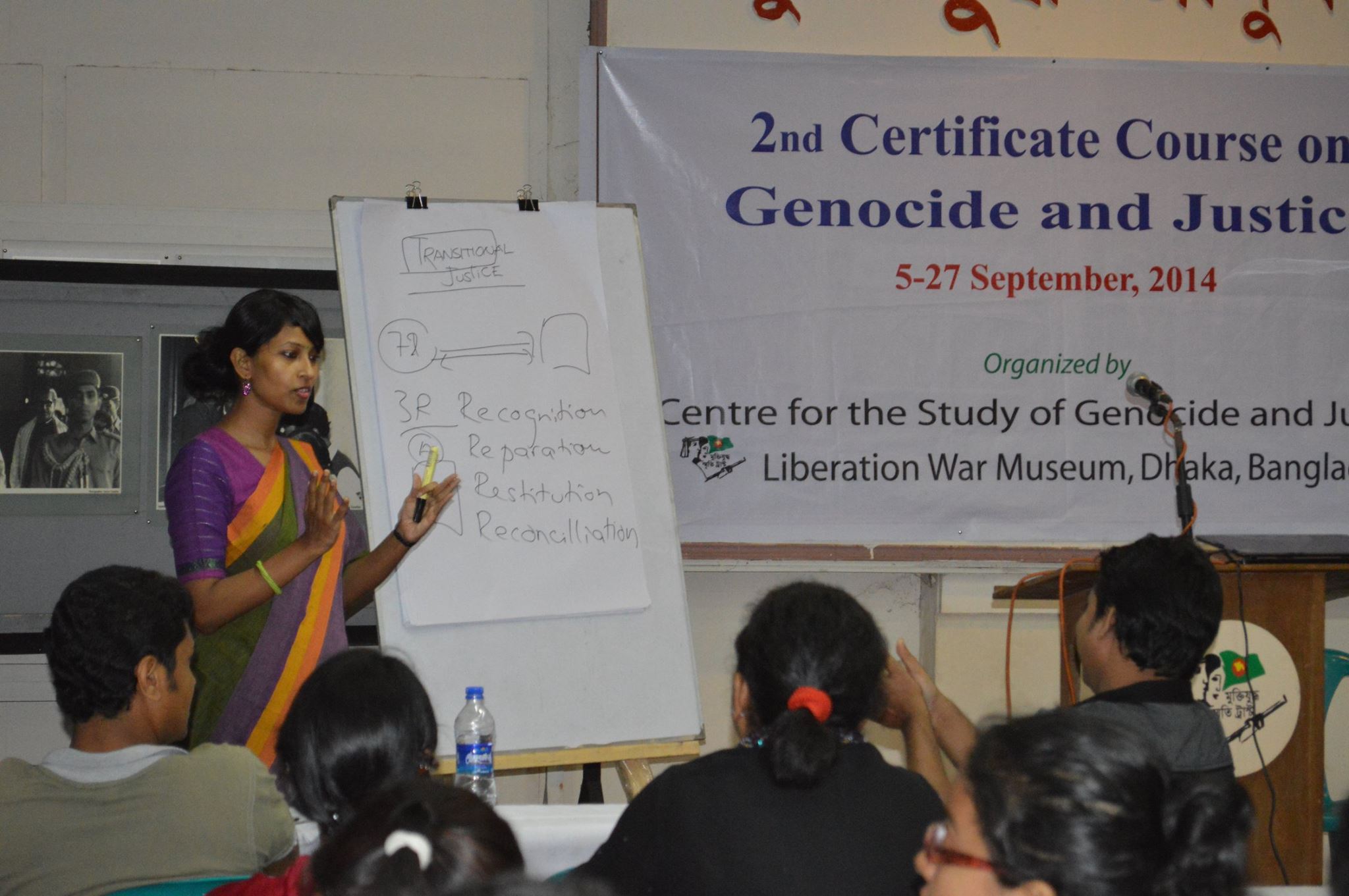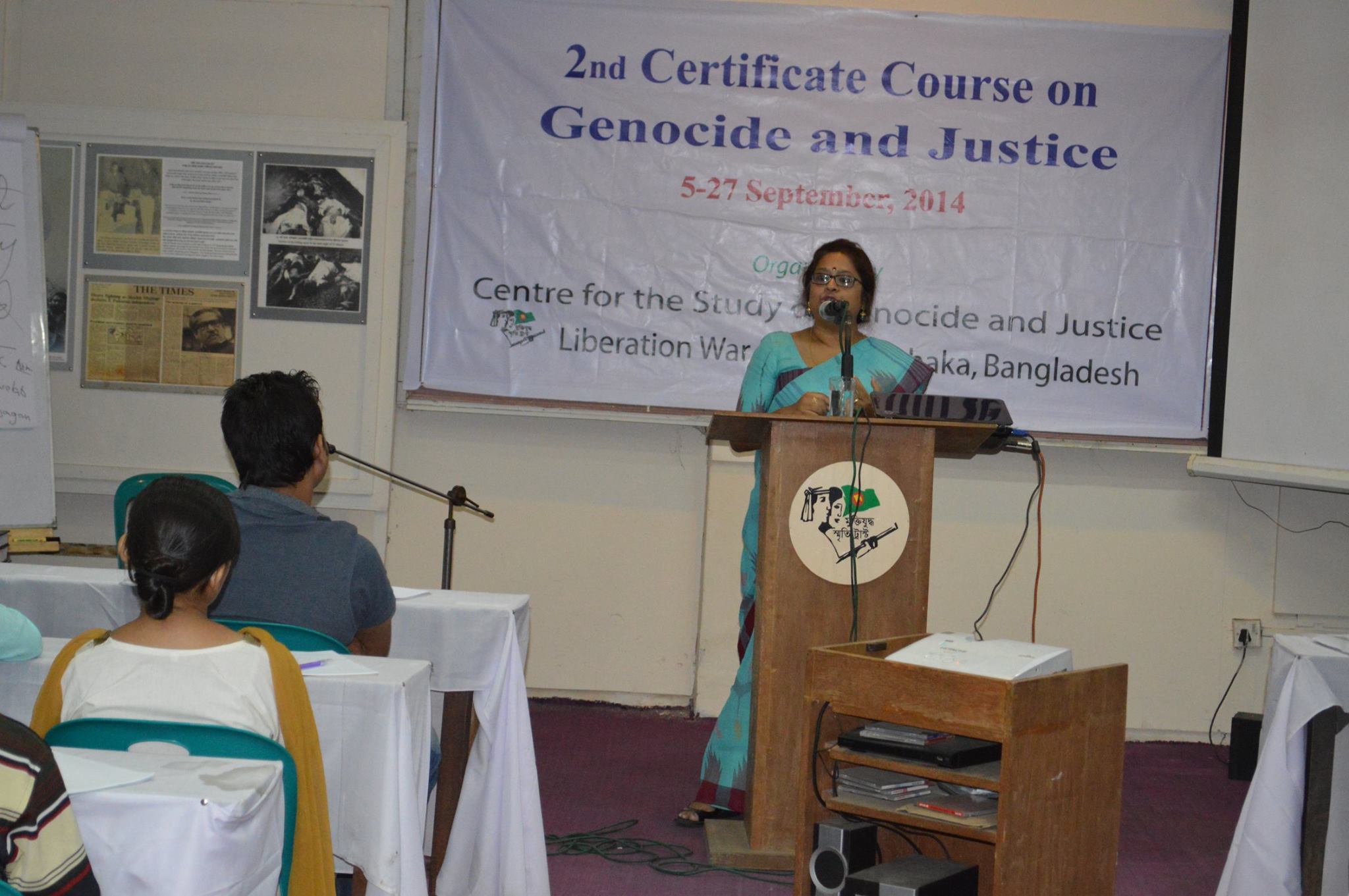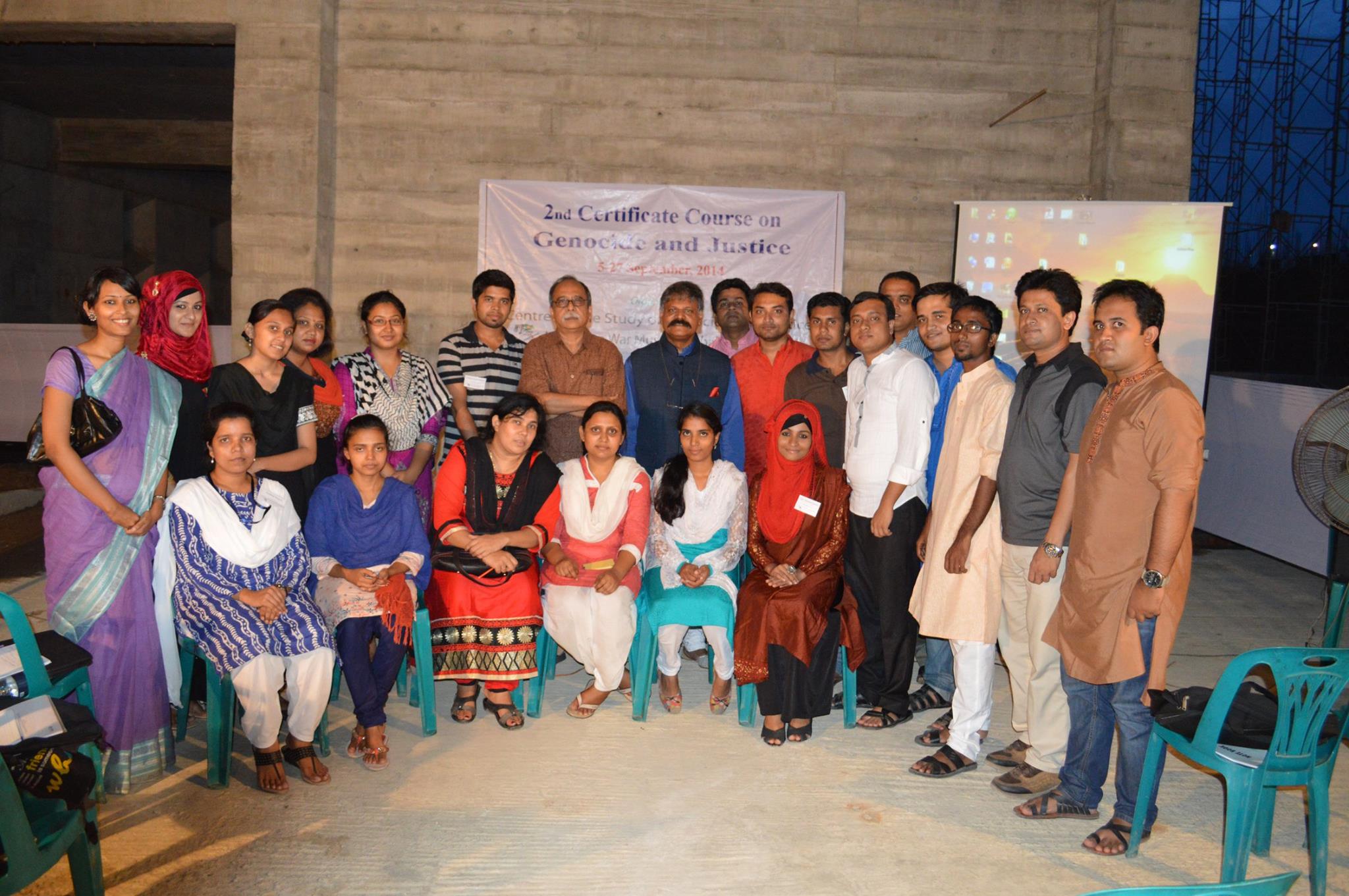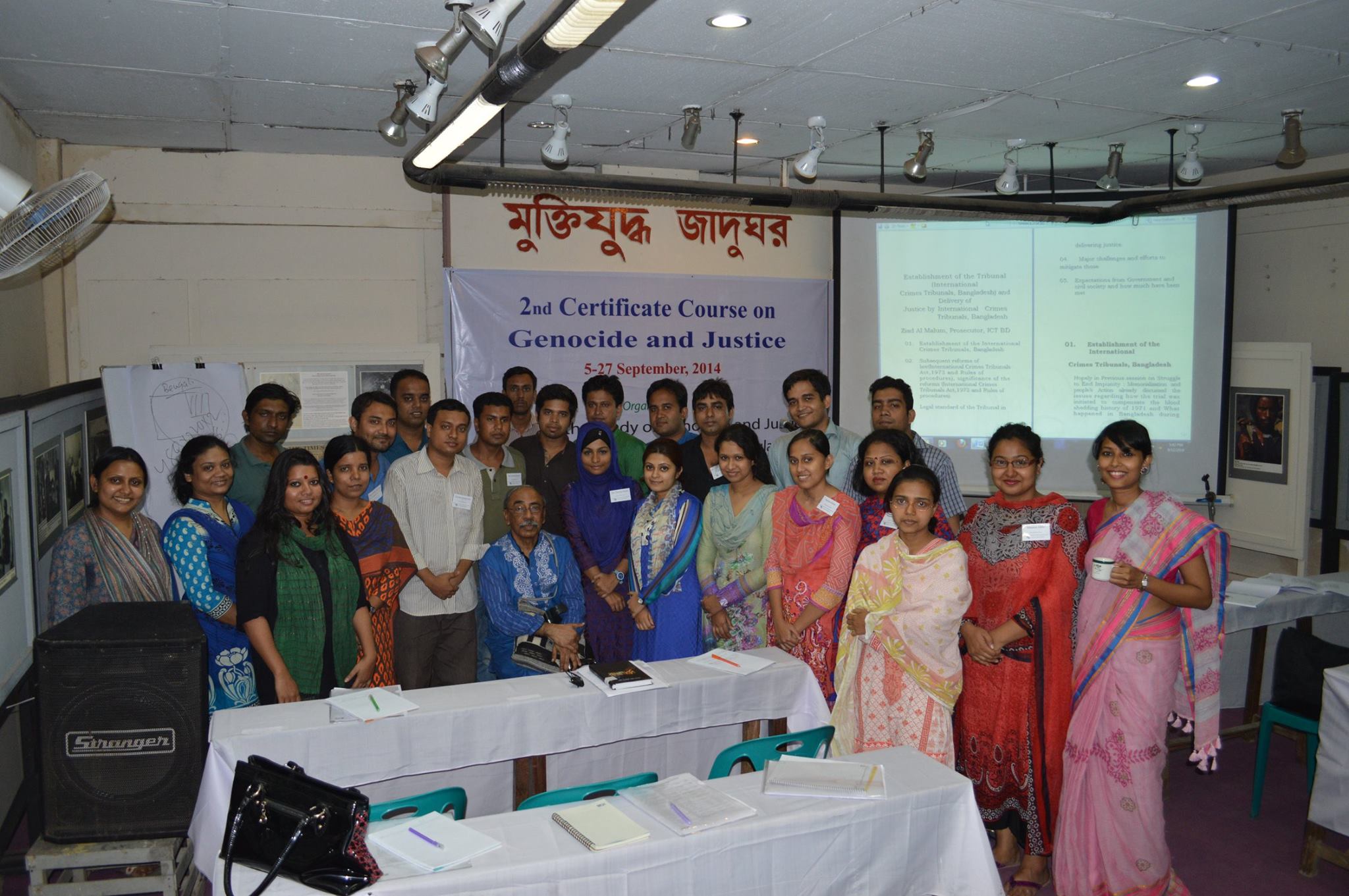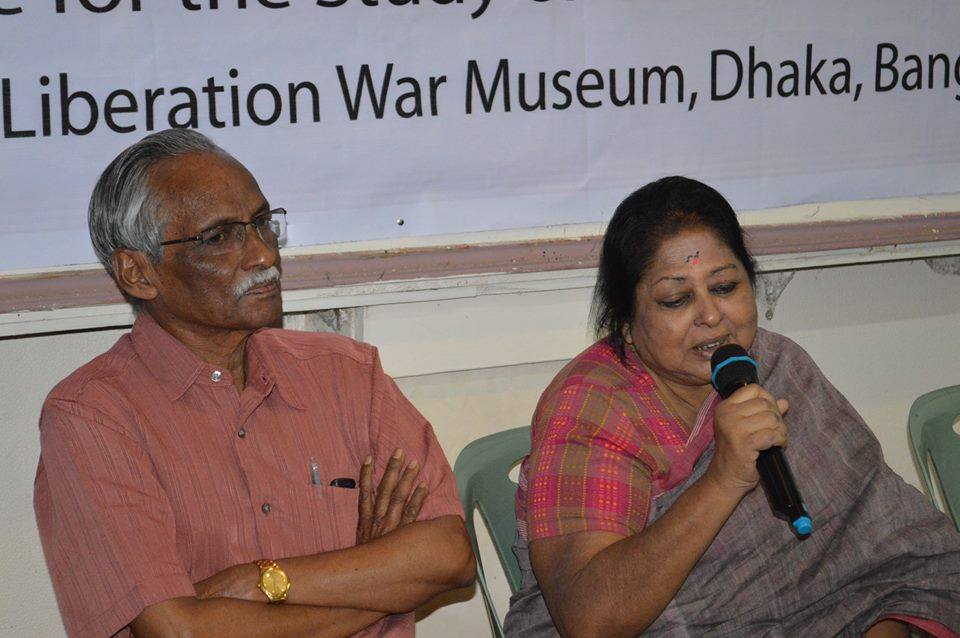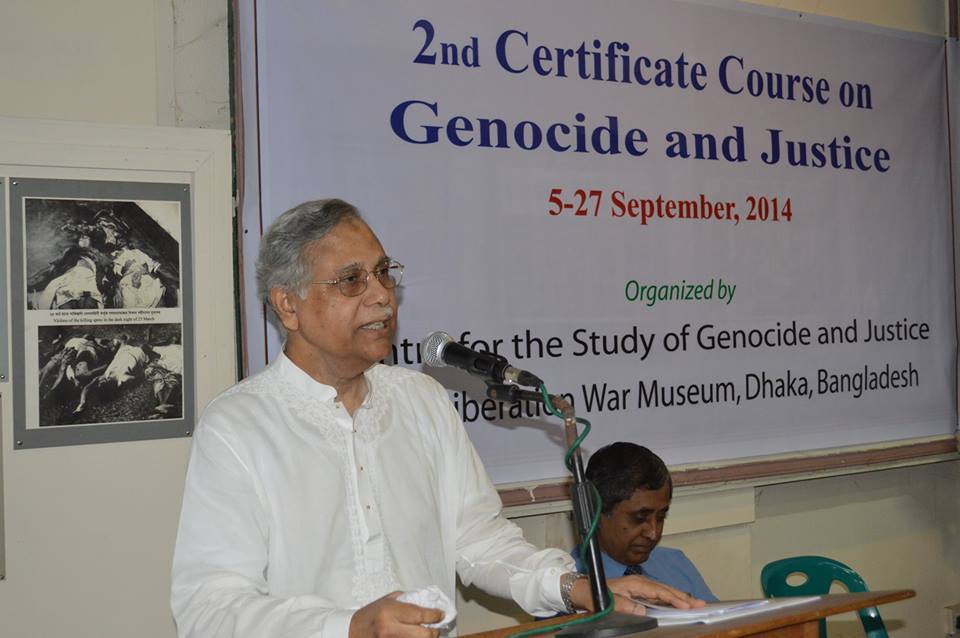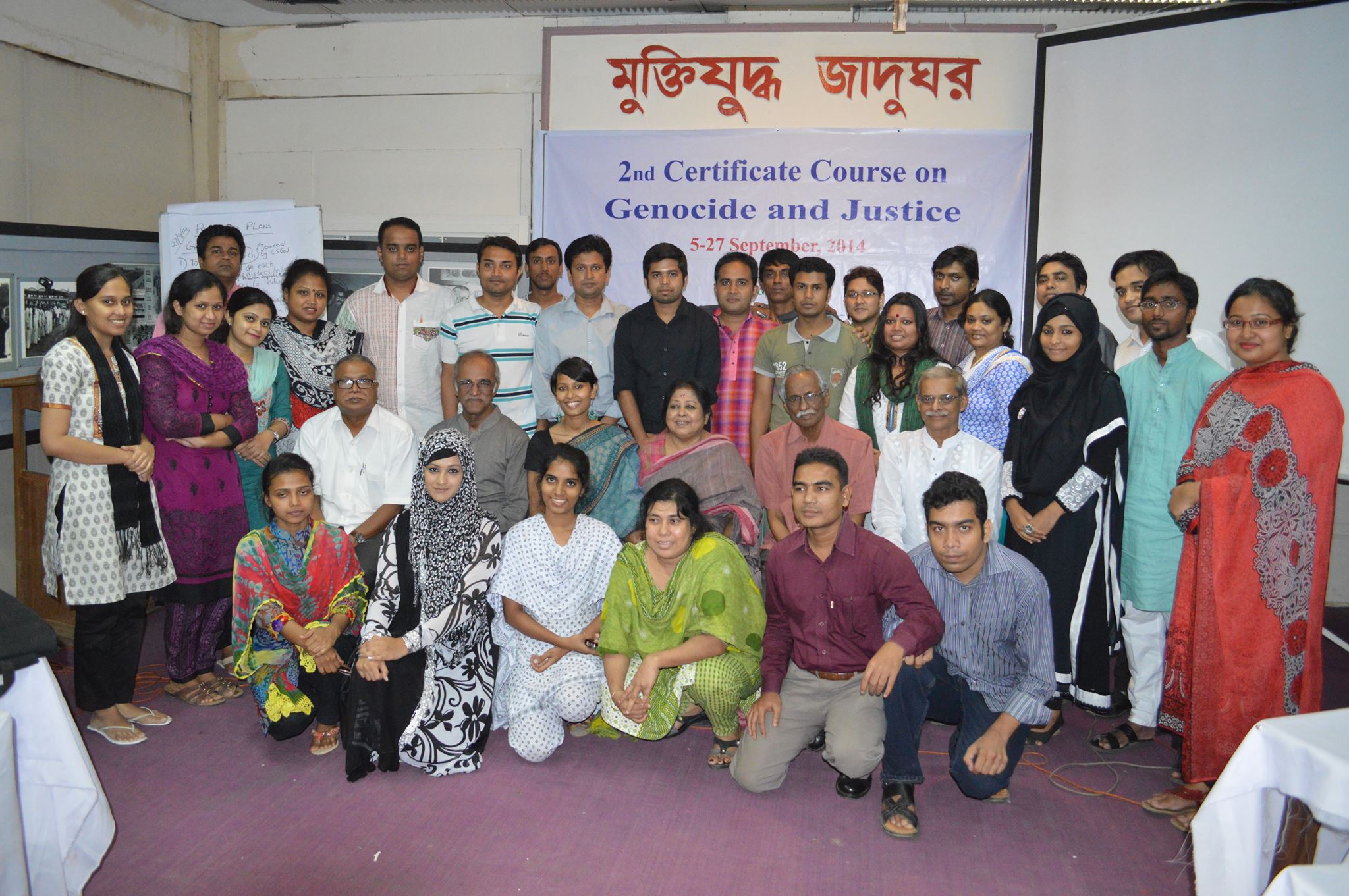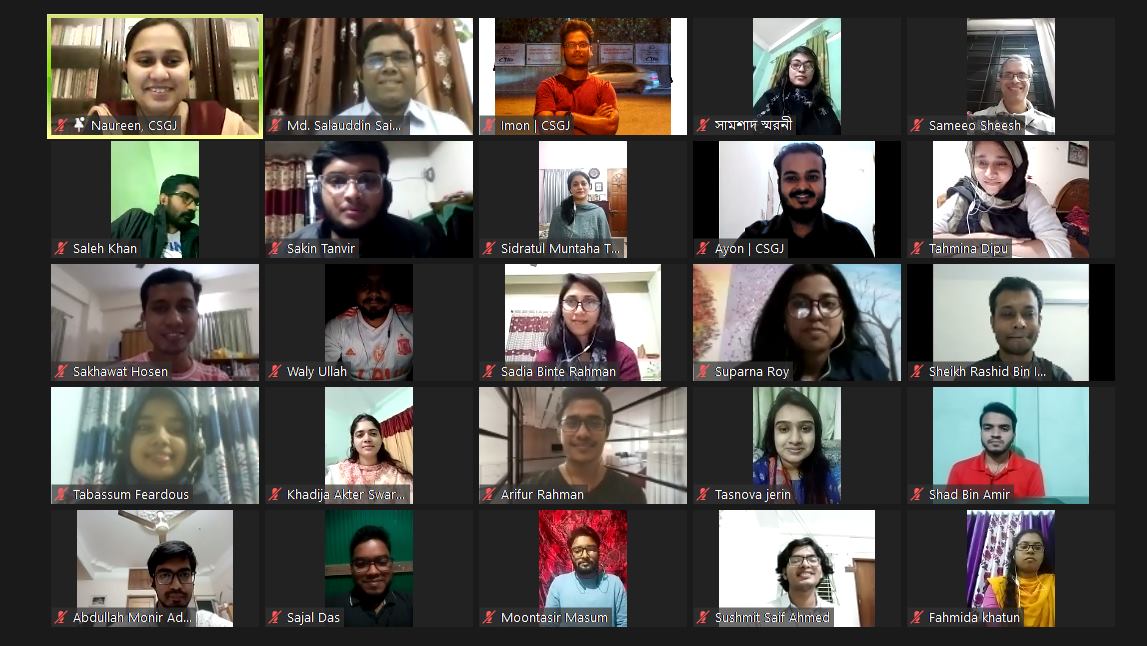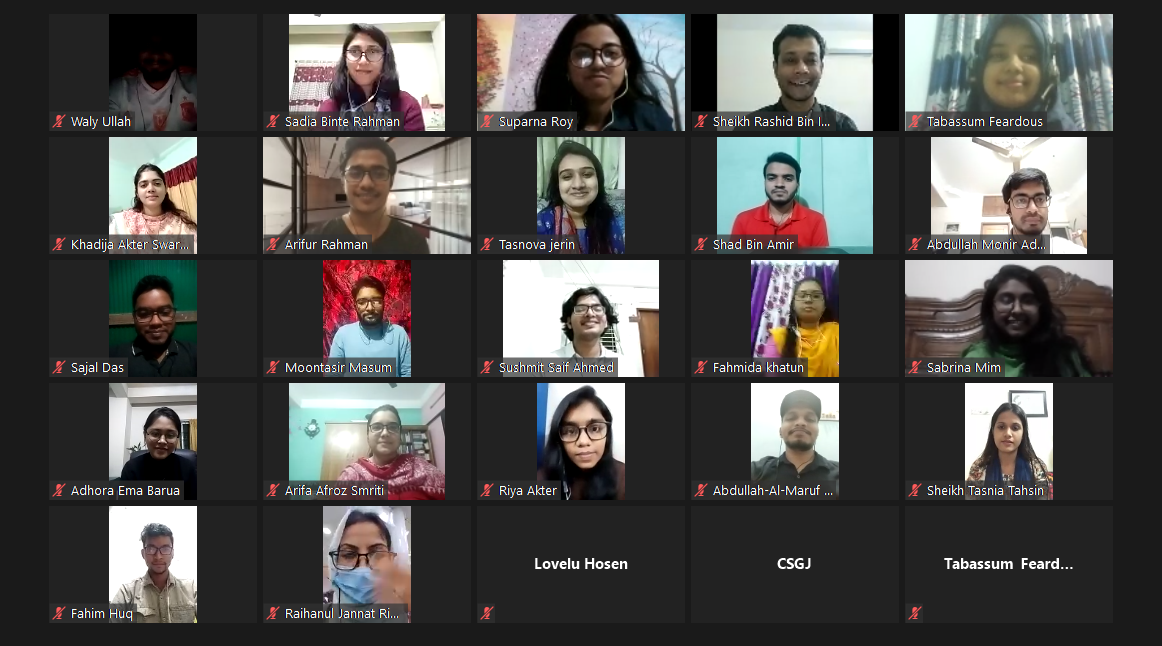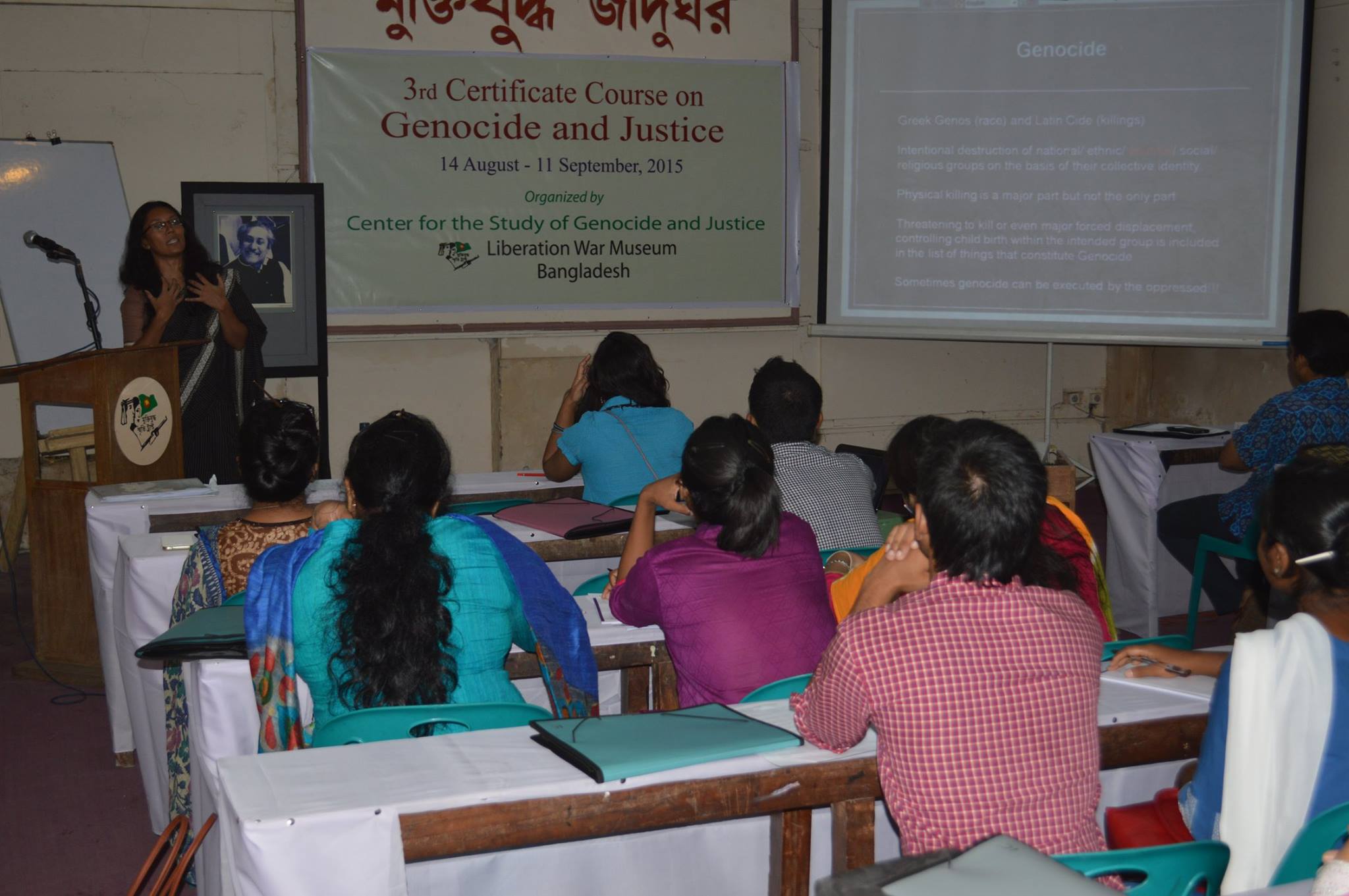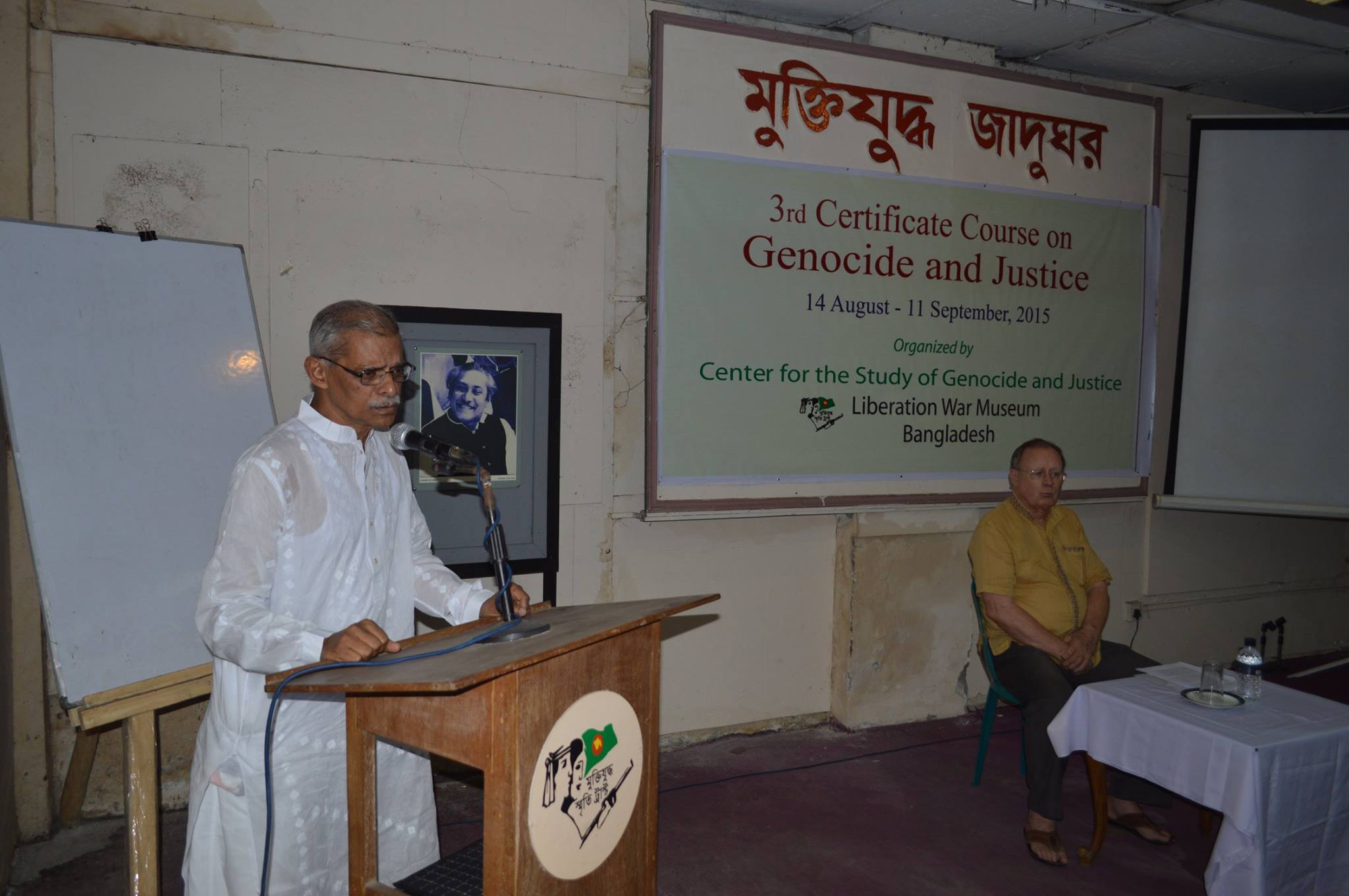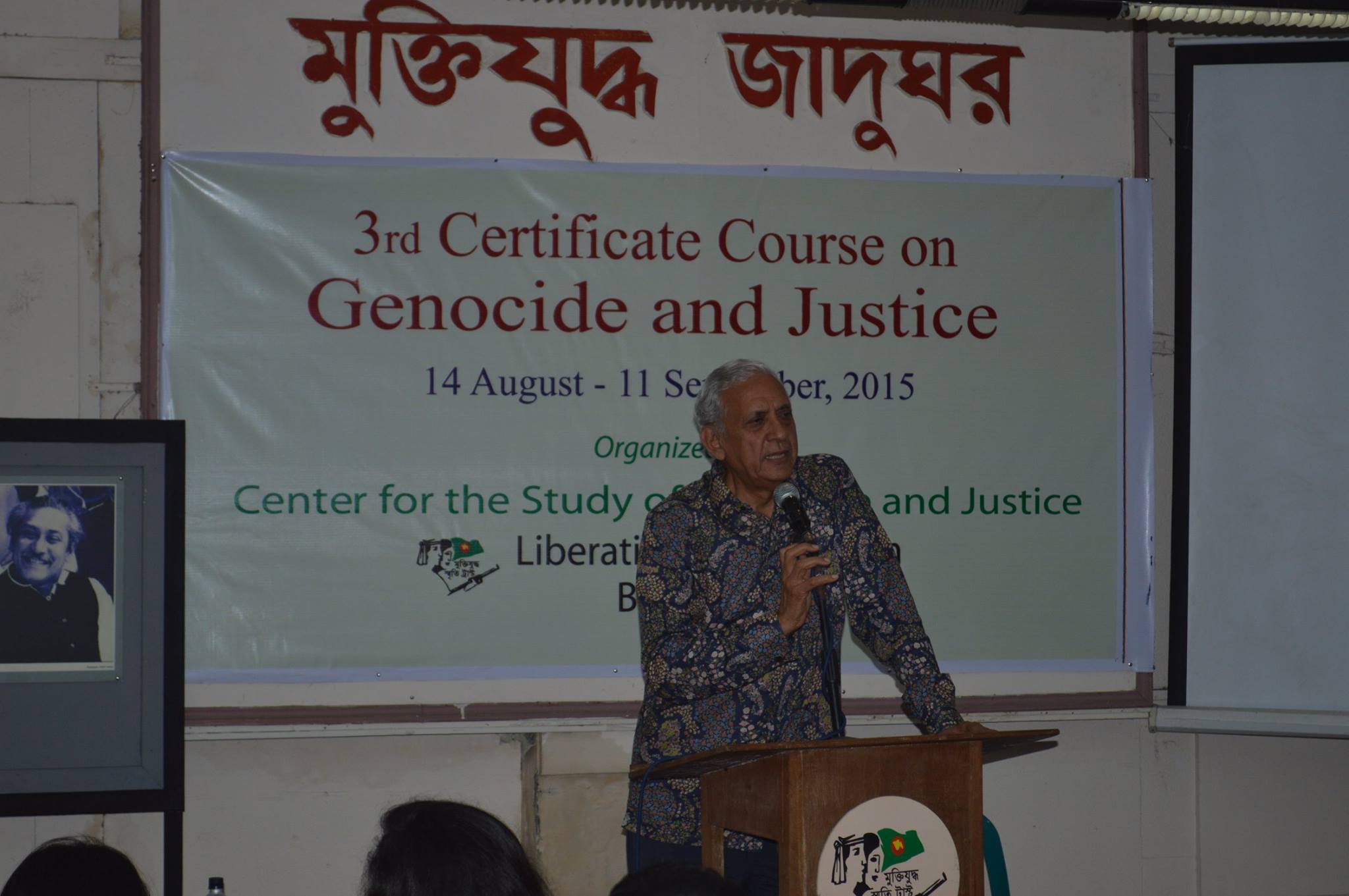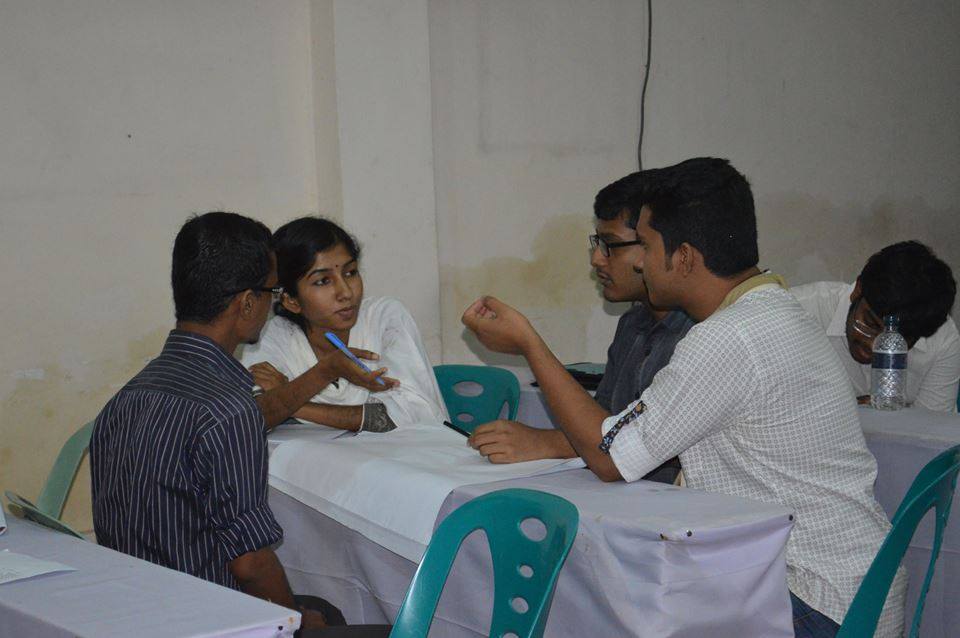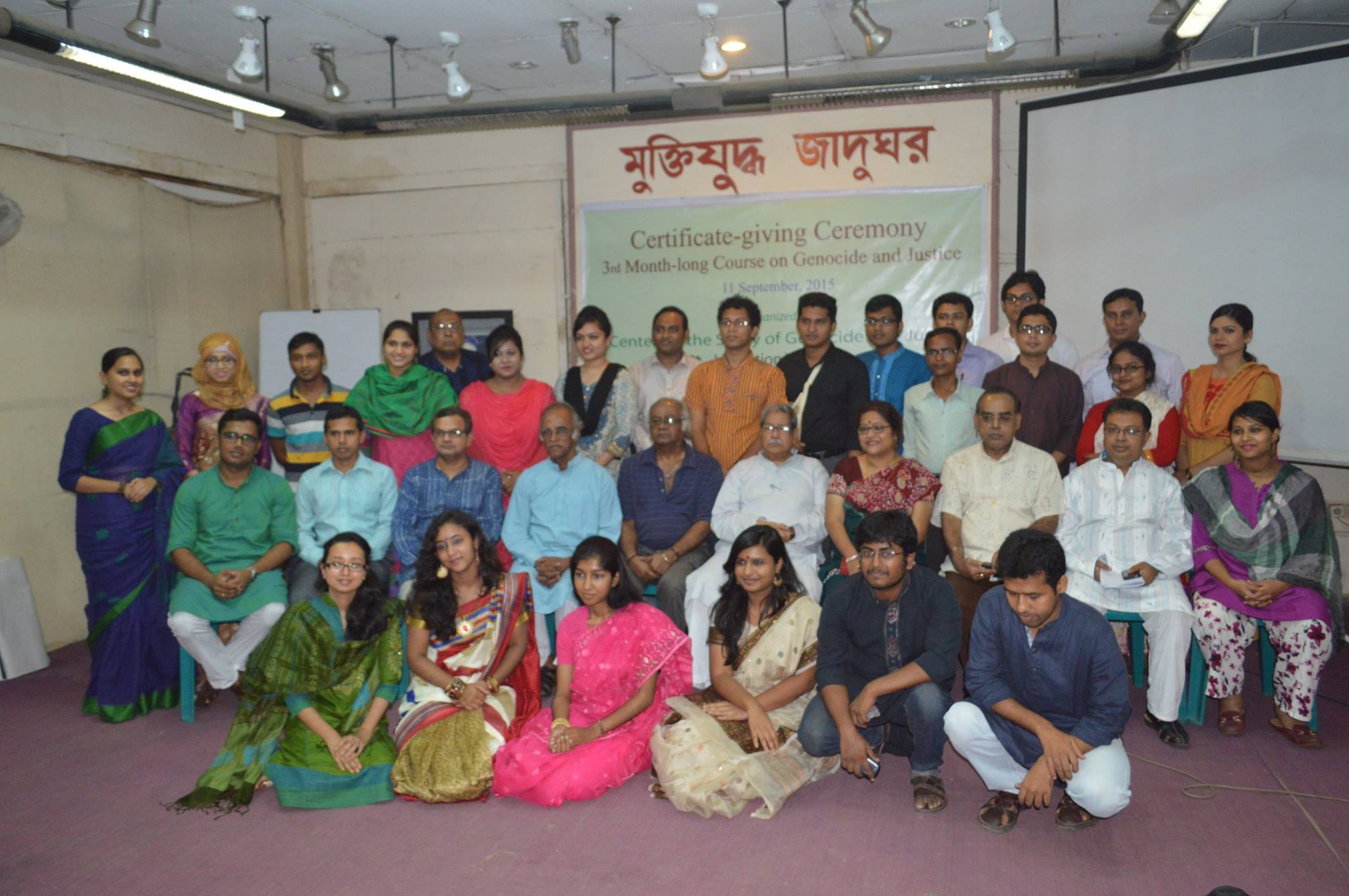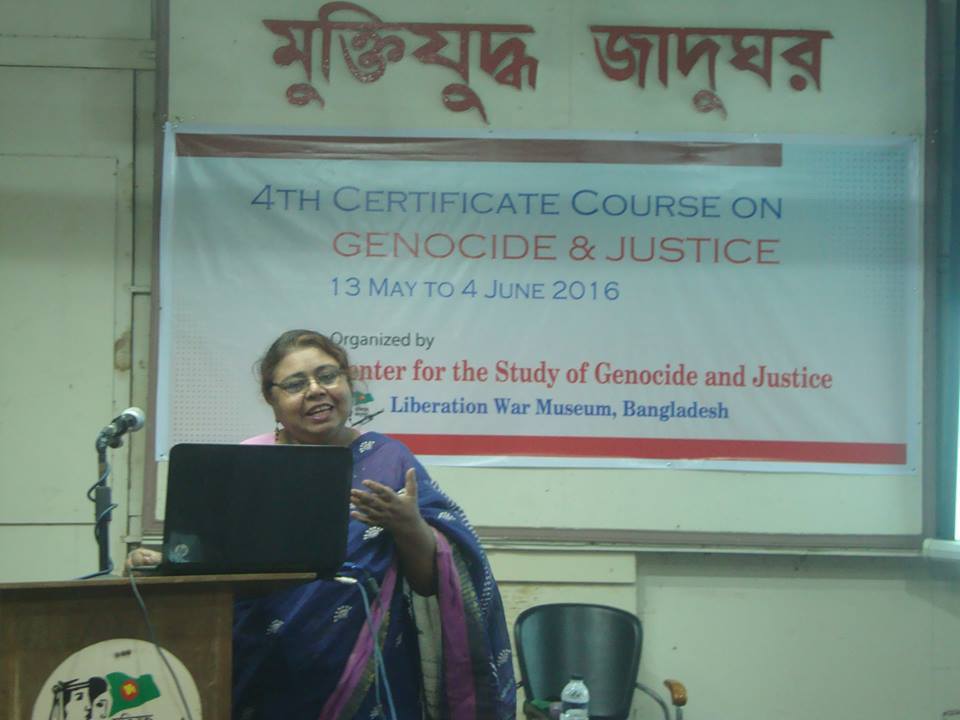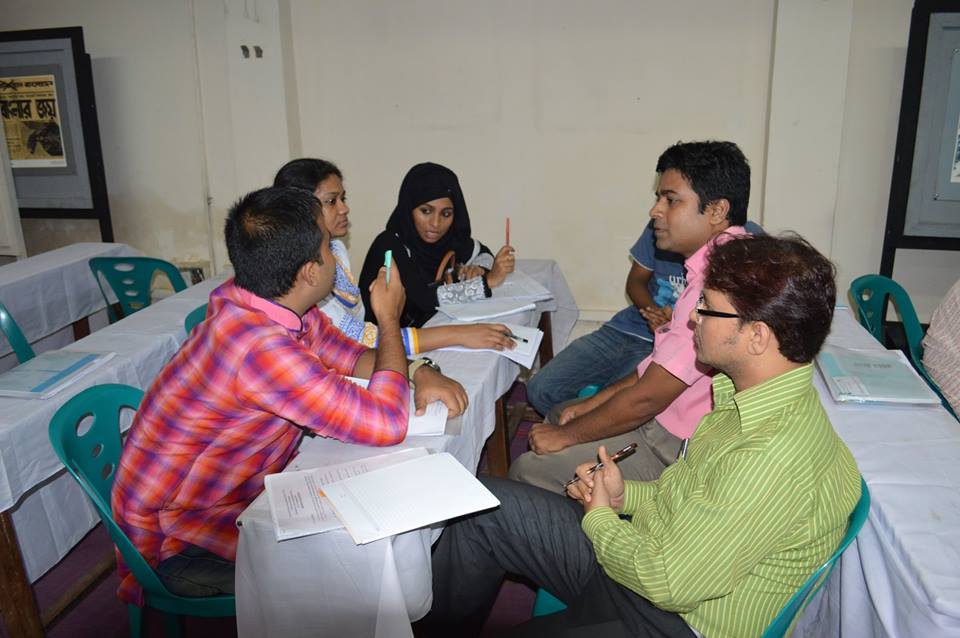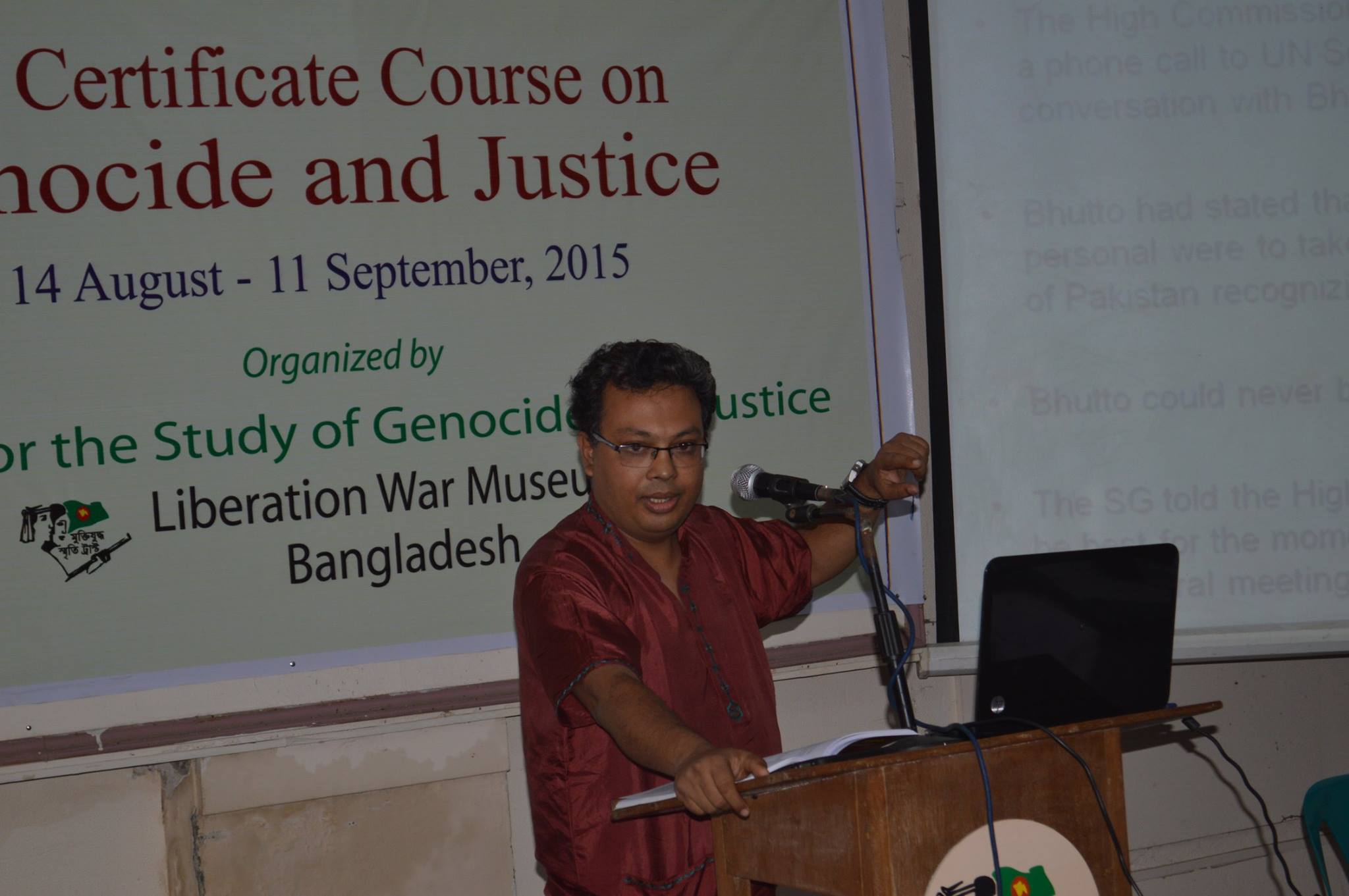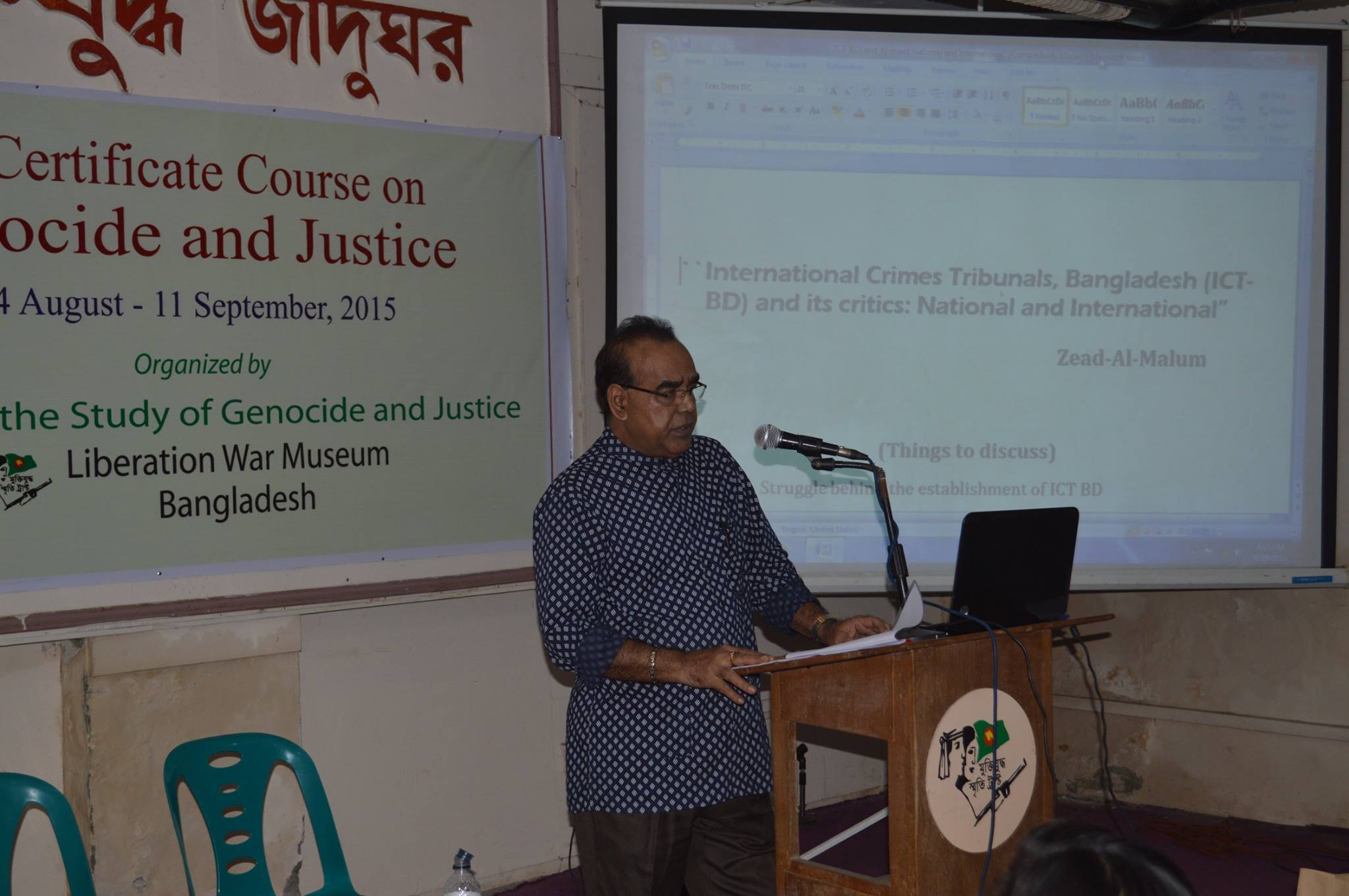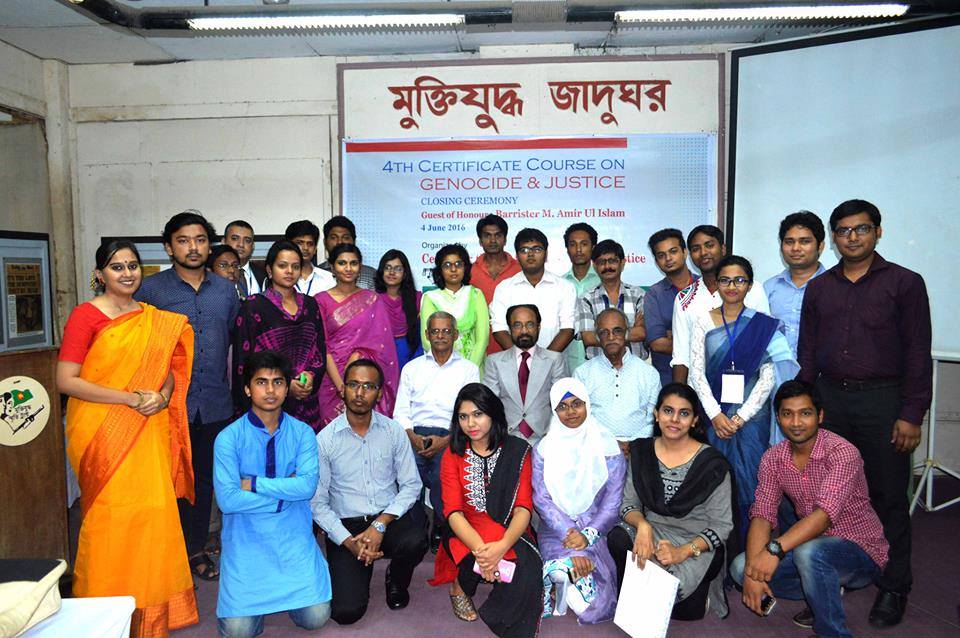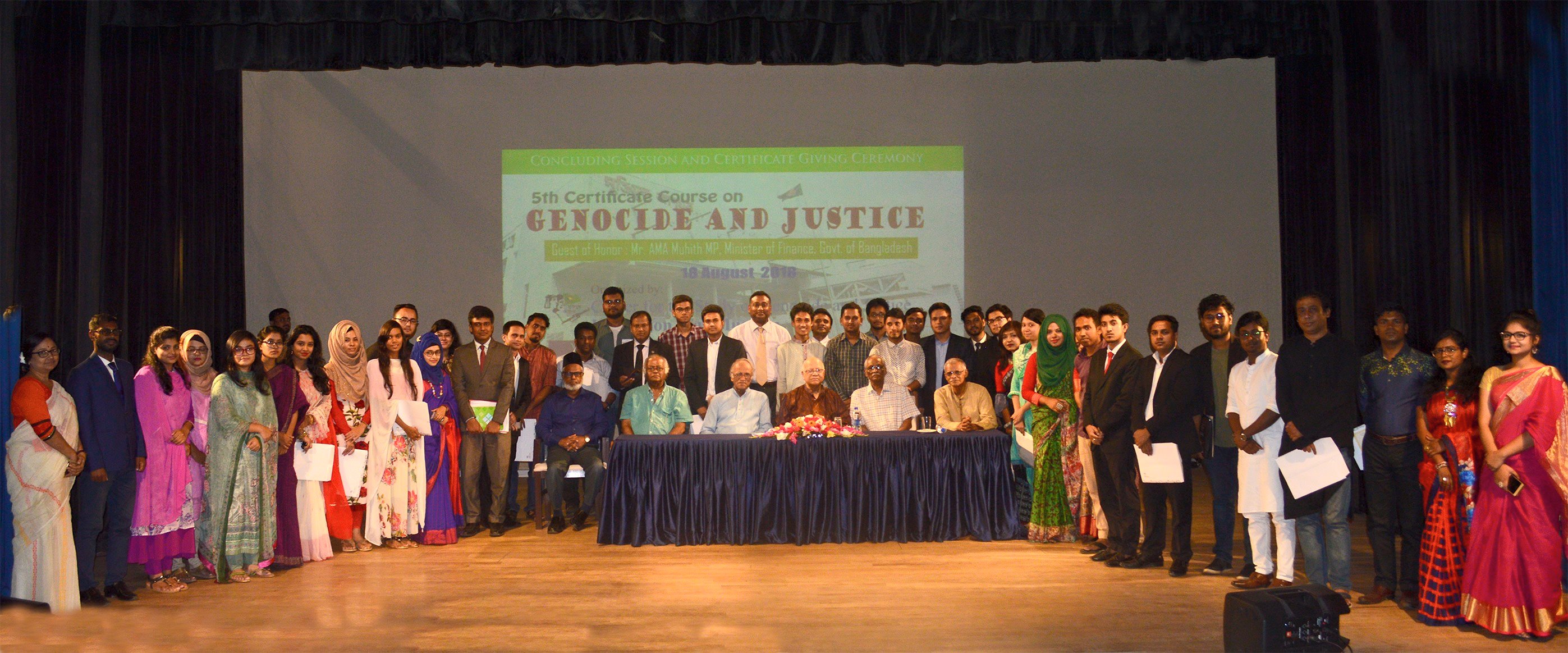Certificate Course
Certificate Course
1st Certificate Course on Genocide and Justice
The very first event by the Center for the Study of Genocide and Justice was the 1st month-long certificate course on genocide and justice. Renowned experts, practitioners and activists delivered lectures on various issues related to international crimes, transitional justice, memory politics, legal aspects of crime and punishment etc. From 08 to 31 May 2014, the participants attended this course in the weekends.
2nd Certificate Course on Genocide and Justice
From 05 to 27 September 2014, CSGJ has arranged its 2nd Certificate Course on genocide and justice. Honorable Former Chief Justice ABM Khairul Hoque and Professor Dr. Shah Alam, Chairman at the Law Commission, Bangladesh had graced the inaugural ceremony of the course. After the completion of the course, Beerangona and Freedom Fighter Ms Ferdousy Priyabhashini handed over the certificates to the successful participants.
3rd Certificate Course on Genocide and Justice
On September 11, 2015, the Center for the Study of Genocide and Justice (CSGJ), Liberation War Museum arranged the certificate giving ceremony for the completion of its third month-long Certificate Course on Genocide and Justice from August 08 2015.
On behalf of the Liberation War Museum, the trustee, Mr. Ziauddin Tariq Ali welcomed the guests and participants in the closing ceremony and also congratulated the participants on their successful completion of this course. Ms. Umme Wara, Lecturer at the Criminology department, University of Dhaka, and Coordinator of CSGJ, briefed the audience about the mission and vision of CSGJ, while the volunteers of this center, shared their views.
“My aim of joining this course was to enrich my knowledge regarding this crucial issue that is Genocide; not only observing the legal aspects but also learning other criteria that acknowledge the crimes as genocide. At the completion of this course, now I succeeded in gathering vast ideas on Genocide and the process of ensuring justice to a greater extent”, said Nusrat Jahan, a participant of this course and a law student from Dhaka University.
The Chief Guest of the ceremony as well as the Director of CSGJ, Professor Emeritus Anisuzzaman, along with Mr. Mofidul Hoque, trustee of the museum and the Director
of CSGJ handed over the certificates to the participants. Md. Mahboob Sobhani was awarded as the Best Participant.
A number of 26 participants attended this month-long course including university students and teachers, Special Judicial Magistrate, journalist, researcher, officials from the civil aviation and the air force. Professors, prosecutors, researchers etc, the resource persons of this course, were also present in this occasion.
This report can be found at: https://www.thedailystar.net/law-our-rights/third-certificate-course-genocide-and-justice-143200
4th Certificate Course on Genocide and Justice
In May 2016, CSGJ has arranged its 4th Certificate Course on Genocide and Justice. After the successful completion of the course, the organizers has arranged a formal closing ceremony for the participants. Barrister M Amir Ul Islam was invited as the Chief Guest of the Closing Ceremony of the 4th Certificate Course. The Chief Guest, along with Mr. Mofidul Hoque, trustee of the museum and the Director of CSGJ handed over the certificates to the participants.
5th Certificate Course on Genocide and Justice
The 5th month-long certificate course on genocide and justice has been organized by CSGJ, LWM from July-August. On 18 August 2018, Mr. Abul Mal Abdul Muhith MP, honorable Minister of Finance to the Government of Bangladesh attended the closing event as the Guest of Honor and handed over the certificates to the successful participants of the course. Honorable trustees of Liberation War Museum, Mr. Rabiul Hussain, Mr. Ziauddin Tariq Ali and Mr. Mofidul Hoque were also present in this event.
6th Certificate Course on Genocide and Justice
The 6th Certificate Course on Genocide and Justice was organized by the Center for the Study of Genocide and Justice where both graduate and undergraduate students and professionals from 25 Universities and institutions actively participated and graduated the course. The course was held from 12 July to 03 August 2019.
1st Online Certificate Course on Genocide and Justice
For the 7th time Center for the Study of Genocide and Justice (CSGJ), Liberation War Museum has successfully organized a month-long certificate course on “Genocide and Justice” from 07 to 30 August, 2020. But this is the very first time for the Center for the Study of Genocide and Justice (CSGJ) has arranged the certificate course online, using Zoom Platform.
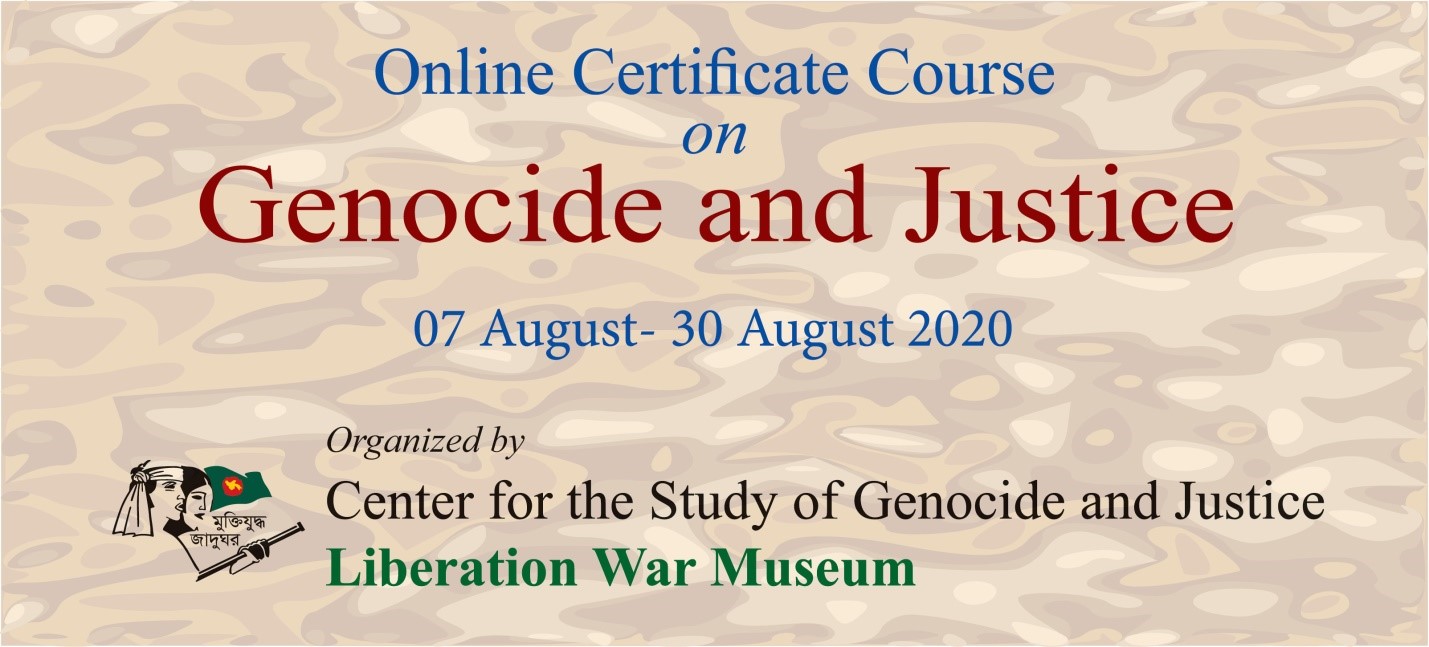
This year the online certificate course was attended by a number of 38 participants from Bangladesh and abroad. Most of the participants were students from 15 different universities, importantly University of Dhaka, Bangladesh University of Professionals, Jahangirnagar University, University of Barishal, Bangladesh Open University, Khulna University, South Asian University (New Delhi, India), Aligarh Muslim University (Aligarh, India) etc, with different backgrounds which include Law, International Relations, History, Journalism, English, Sociology, Criminology, Development Studies, Women and Gender Studies, Bangladesh and Liberation War Studies. Students from Bangabandhu Sheikh Mujibur Rahman Science and Technology University, Gopalganj & Noakhali Science and Technology University were participated the course for the first time. A notable number of young professional from different government and non-government organization such as government employee, lawyer, presenter and researcher were also participated.
The course was inaugurated by Mr. Mofidul Hoque, Director, Center for the Study of Genocide and Justice & Trustee, Liberation War Museum. On every Friday and Saturday afternoon of the month of August, prominent scholars and practitioners from Bangladesh and abroad in the field of international criminal law, genocide and history conducted the sessions.
August 07, Friday
On August 07, Friday, the first session of the certificate course titled, “Development of International Criminal Justice Institutions: From Nuremberg, Tokyo Tribunal to the ICC” was conducted by Ms. Naureen Rahim, Coordinator, CSGJ & Adjunct Lecturer, School of Liberal Arts and Social Sciences, Independent University Bangladesh.
Followed by the first session the second session of the day was conducted by Mr. Emraan Azad, Lecturer in Law, Bangladesh University of Professionals (BUP) on “Introduction to the Core International Crimes.” The resource person, in his session introduced the participants with the crimes which has core international status.
08 August, Saturday
On 08 August, Saturday, Dr. Ahrar Ahmed, Professor Emeritus, Black Hill University, USA took a session titled, “From Partition of 1947 to Liberation War of 1971: The Politics of Conflict and Amnesia.” Dr. Ahmed also talked about displacements, trauma, and emotional struggle as well. He clearly said that the history is been distorted as it is polarized by the power and other evil forces. There are three moments that he thought particularly relevant to partition. The first was the Permanent Settlement Act 1793, which the British were legally making land revenue more efficient, more rational and easier but which had the unintended consequence of leading to a new structure of land ownership in the country and the communalization of classification. The second was in 1881 which led to the conscious institutionalization of social and communal divisions. It forced people to identify themselves as Hindus or Muslims or Sikhs or Jains. The third event was the partition of Bengali in 1895 which could be considered to be a cunning plot ‘divide and conquer’ or a reasonable decision to make this administration more manageable.
He also mentioned about three things that propelled liberation war in 1971 and our freedom. Firstly, Bangabandhu Sheikh Mujibur Rahman, Tajuddin Ahmed, Mansur Ali as well as Nazrul Islam and so many others who were also part of the process of party building and consolidation and mobilization and so on. The second thing that, when people start to understand that they are not object of the story rather they are the subject of this tree and they can change history. The third thing that happened was the election of Pakistan occurred in 1970. Then he praised the political maturity of Bangladeshi giving the example of the election of 1936-37, 1946, 1954, 1970.
In conclusion he said history should not be emotionalized, sentimentalized. History is not a conclusion. It is a process of discovery based on empirical evidence, logical soundness and reasonable assumptions. So we must always be willing to question to scrutinize to examine conclusions and explanations that this is how knowledge is actually enhanced.
His lecture can be found here: https://www.youtube.com/watch?v=TjURFiJ3q14
Followed by the first one the second session of that day was conducted by Dr. M Sanjeeb Hossain, Teaching Fellow, Warwick Law School on “Bangladesh 1971: Acts of Genocide and Crimes against Humanity.” His lecture was divided into two parts. The first part was about the nature and extent of the atrocities by the Pakistani Army and local auxiliary forces. And then about the local auxiliary force themselves. Later he briefed some initiative which was taken to bring the perpetrators to justice.
He told that at the time of Bangladesh Liberation War, Pakistani Army and local auxiliary forces committed International crimes which included murder, rape, abduction, force deportation etc. He mentioned some books and documentation as evidence of these brutal crimes. Then he introduced a journalist Simon Dring who witnessed and published his observations of brutality on 30th March in the Daily Telegraph. A writer Hawant reported that, “Members of Awami League were shot like dogs.” He shared some true stories and other references from magazines, reports, news agency etc. His description of Razakar Al-Badar, Al-Shams and there violation of human rights and committed crimes against humanity made the audience clear that these Pakistani and local brutes needed to be brought under the law. Dr. Hossain also discussed two major quests to bring justice that took place at that time under the Bangladesh Collaborators Special Tribunal Order 1972. Then he talked about International Crimes Tribunal of Bangladesh which was basically formed under the International Crimes Tribunal Act 1973. Lastly he was optimistic about International Crimes Tribunal which can be a definitive attempt to deliver justice to the victims of the mass atrocities whether it is genocide or crimes against humanity happened in Bangladesh.
His lecture can be found here: https://www.youtube.com/watch?v=i6xjswIIRJs
August 14, Friday
On August 14, Friday, first session titled, “Standing by Refugees in Bangladesh from Displacement to Solutions: 1971 to 2020” was discussed by Ms. Haruno Nakashiba, Senior Protection Officer, UNHCR Bangladesh. She started her session with a brief background about UNCHR adoption. Then she moved on with detail explanation of “refugee” definition under Refugee Convention 1951 and also stated about persecution which has subjective and objective elements. UNHCR now assist 20 million refugees who meet this criterion. She also elaborated the term stateless persons and under this definition how stateless person can be refugee. She talked about three durable solutions for refugee problem. Her lecture was mainly focused on the UNHCR contribution and challenges in 1971 displacement and forcefully displaced Rohingya people. In 1971 after March 10 million people fled Bangladesh to India. UNHCR at that time took the role of focal point and tried to mobilize international assistance, coordinate with India and after the war facilitate repatriation, helped to set up transitional camp. Then Ms. Harano Nakashiba moved her discussion on Rohingya refugee camps, contribution and challenges UNHCR are facing. She expressed her respect for Bangladeshi people and Government for the humanitarian decision and hosting the largest refugee camp for Rohingya people. She also compared the 2020 situation with 1971. Ms. Harano finished her session with stating probable solutions for voluntary repatriation for Rohingya refugees.
Her lecture can be found here: https://www.youtube.com/watch?v=6UgI1sSeljU
After the first session of the day a public lecture on “Bangabandhu and His Struggle to establish Justice for Genocide Victims” was given by Mr. Mofidul Hoque, Director, CSGJ & Trustee, Liberation War Museum as the second session. He started his lecture by giving tribute to the great leader Bangabandhu Sheikh Mujibur Rahman and to his contribution at our liberation. At first he emphasized on the situation at that time and said that time it was a different world then but Bangabandhu took strong position with his commitment. He mentioned a very interesting similarity with Rwanda Genocide and our Liberation war. Both started and ended on a particular day. Then Mr. Hoque gave a brief on the atrocities committed by Pakistani army in 1971. He said it is the classic case of Genocide. After this he moved on the main topic of the lecture, the contribution after his return on 10th January 1972 to 14th August 1975. After returned from Pakistani jail, Bangabandhu firstly made an appeal to the UN to send a team of investigators and arrange the trial of the perpetrators of atrocity crimes. But international community was not cooperative. Bangabandhu enacted Bangladesh Collaborators Order on 24th January, 1972 within two weeks of his return.
Mr. Mofidul Hoque also discussed about the complex global scenario of that time regarding Bangladesh Liberation War. The major challenge before Bangabandhu was rebuild the country. Speaker stated the salient features of the measures undertaken by Bangabandhu government. Trial of local collaborators and Pakistani perpetrators in Bangladesh hold high moral ground to ensure justice but the implementation was not easy. Mr. Haque tried to cover all the challenges Bangabandhu was facing at that time like, with 96 thousand surrendered Pakistani army, international community’s pressure, strong Pakistan’s pressure, lack of procedural rules in international law and civilians who stuck in Pakistan. He also mentioned about Justice Hamidul Rahman Commision which never saw light of the day. Mr. Haque said all those circumstances lead to the unfulfilled task for humanity. He concluded his lecture with quoting Kamal Hossain about the frustration Bangabandhu showed to him for couldn’t fulfilling his commitment to bring the war criminals under trial on the soil of Bangladesh.
This lecture can be found here: https://www.youtube.com/watch?v=jDGpALWLnuc
21 August, Friday
On 21 August, Friday, a session titled, “The Victims of Sexual Violence- Experiences from the Cambodian Women’s Oral History Project” was conducted by Dr. Theresa de Langis, Academician & Genocide Scholar, USA. Dr. Theresa started the session by introducing some valuable information from her research about the victims of sexual violence during the mass atrocity in Cambodia (1975-1979), which she has collected in 8 years from 26 victims during her stay in the country. Then she highlighted about the mass atrocity where near about 2 million people died due to mass execution, over work and other war crimes.
In her presentation she briefly introduced some legal terms with participants i.e. ICRC, ECCC, CRSV, CRSGBV. She also mentioned the similarity of Cambodian genocide with war crimes and Genocide during the Liberation War of Bangladesh. She mentioned that at the beginning of establishing the strategy of the tribunal, sexual assault was reported as supplemental submission, later on got full attention including forced marriage. She explained the whole process of forced marriage and the consequences if denied. In her presentation it was clearly told that these mass rapes, gang rapes, sexual slavery, sexual mutilation such as forced marriages, forced pregnancy was initially neglected in the trail. After that she enlightened with her valuable opinion regarding these issues.
Dr. Theresa said that every individual whether they are men, women, transgender or belongs to any ethnicity have the right to justice. This fact was importantly told that sexual assault is a part of genocide without killing against the marginalized community of the society and women are the main victim of it. In order to ensure the Justice we need to understand genocide and its impact in the society. In the conclusion she drew the attention to the dark side of the discriminatory society, where women remains silent if there is any sexual harassment, domestic violence, forced marriage etc. due to weak socio-economic condition of women.
Her lecture can be found here: https://www.youtube.com/watch?v=LspBng5y_cU
22 August, Saturday
On 22 August, Saturday, Dr. Tomasz Lachowski, Asst. Professor, Faculty of Law & Administration, University of Lodz, Poland took the first session titled, “Transitional Justice in ongoing Conflicts and Post War Reconstruction.” He started with his PhD experience in Bangladesh about the victim’s justice within the transitional justice on the ICT as sort of a mechanism & then talked about the possible establishment of the international transitional administrations, mostly by external actors, like the UN, basically the UN-SC. He also mentioned the failure of communist regime, firstly in Poland and then in other countries like Czechoslovakia, Hungary etc. Then he gave some brief ideas about transitional justice on different country perspective.
Mr. Tomasz added that the notion of transitional justice comprises the full range of processes and mechanisms associated with a society’s attempts to come to terms with the legacy of large scale past abuses in order to ensure accountability, serve justice and achieve reconciliation. And this may include both judicial and non judicial mechanisms. He concentrates mostly on the issue of criminal justice, as in the traditional manner, justice is always associated with this sort of justice. So, the person responsible for committing heinous crimes in situations like armed conflicts shall be held accountable before international or domestic relevant court. But transitional justice as such cannot be associated with solely with the response of this classical criminal justice. Further Mr. Tomasz discussed about some ongoing conflicts over the world show pathways to stop them and hoped to stop the violence, and to move on to the peace situation.
His lecture be found here: https://www.youtube.com/watch?v=l1nyBTJWqZw
The second session of the day was conducted by Mr. Shahriar Kabir, Author and Activist on “Role of Peoples’ Tribunals in Ending Impunity- Bangladesh Perspective.” He started his session with the topic of genocide of 1971 and mentioned, it was the biggest crime that happed against humanity and peace after the World War Two. He added that 3 million people were killed during the war of liberation, 5 million women were tortured in public and 2 million in private, 10 million people were forced to flee the country and many were displaced inside the country. The Government then decided to try the perpetrators of the war crime. A circular was issued by the government in September and even the first cabinet meeting on January, discussed the trial of those involved in the massacre. On January 10, 1972, Father of the Nation Bangabandhu Sheikh Mujibur Rahman came to Bangladesh from a Pakistani prison and spoke at his first public meeting about the genocide. On 24 January 1972, 63 tribunals were constituted under the Collaborators Act, and shortly after the commencement of the trial, it was found that many had been mistakenly arrested. Bangabandhu then issued a general amnesty. This general amnesty states that those who have committed the specified 18 offenses will not be included in this general amnesty. During Bangabandhu’s lifetime it is seen that 63 tribunals were formed, about three thousand people were tried, out of which 652 people were acquitted with evidence in the tribunal as criminals and were also sentenced to death.
Unfortunately, on 15 August 1975, Father of the Nation Bangabandhu Sheikh Mujibur Rahman was assassinated in his own family. Then there is Ziaur Rahman, the founder of the BNP, who came to power and stopped the trial as soon as he came to power. Not only that, he repealed the Brokers Act on December 31, 1985, so all those who were being punished under the Collaborators Act appealed to the High Court for their release. Their main point was how we would be punished by a law that no longer exists. As a result, everyone was released from this punishment. But another great thing that Bangabandhu did was that he enacted a law to try international crimes through the constitution. For this reason, Ziaur Rahman could not change it. The first amendment to the constitution of Bangladesh stated that those who would be arrested under this law would be deprived of many opportunities in the constitution. Since 1975, Major Ziaur Rahman has introduced the culture of impunity. This has never been accepted by the families of the martyrs, who have been seeking justice for the war criminals since 1972.
Mr. Shahriar Kabir added Ghulam Azam, an Ameer of Jamaat who had acquired Pakistani citizenship and on whose orders the genocide took place, came to Bangladesh with the contribution of Ziaur Rahman. This issue provoked a strong reaction among the people of Bangladesh and inside and outside the Parliament.
After planning to hold a people’s court at Suhrawardy Udyan on March 26, 1992, an order was issued by the government that those who will hold a people’s court are taking the law into their own hands and will be punished but they did not stop, they rallied. 10 types of evidences were found against Ghulam Azam, who was sentenced to death. A day after the rally, all the members of their committee were charged with treason. Later, when the Awami League government was in power, they were actually released. The Awami League won the 2010 elections and began prosecuting war criminals.
Mr. Shahriar Kabir ended his lecture by that, Bangladesh is the first country where war criminals have been tried by special tribunals due to the overwhelming support of the people and the intense movement. In the rest of the world, these trials are conducted by the government.
August 28, Friday
On August 28, Friday, Dr. Samina Luthfa, Associate Professor, Department of Sociology, University of Dhaka spoke over the topic titled, ”Genocide Denial, Social Movements and People’s Struggle for Justice” in the first session of the day.
In doing so she firstly pointed out some social dimension of genocide. Giving some hint about Genocide in general she moved deeper into the genocide of Bangladesh in particular. Further, she explained how social movement can be a major process of seeking justice. She mentioned about the actors or partaker of the process and explained it through the example of Shahabag social movement. She clarifies how divisive politics works as a hindrance towards justice. How society can be understood through the institutions is explained from the social point of view. Then she refers that how the denial begins. In that case she pointed that when people of the society go far from nurturing true history the path of denial begins from the society which helps the guilty people to systematically formulate the denial process. They began to have benefits from ambiguity, ignorance among the people.
Then she suggested that a pathway for justice can be created through social movements. In doing so people need to frame the injustice systematically by which they can prove the injustice happened to them. A sense of victimhood among the people of society would be another step through which they would know about their loss. If these processes move forward then people will began to make change in search of justice and a wholesome spirit would be grown. The path way justice is important to remove the curtain which covers the goal of justice. Eventually this process will make people focused as they become aware of loss and try to strongly ask for their rights.
Her lecture (in Bangla) can be found here: https://www.youtube.com/watch?v=saUx1PVcOrs
The second session of the day was conducted by Mr. Patrick Burgess, President, Asia Justice and Rights (AJAR) on “International Legal Options for Addressing the Rohingya genocide: ICJ, ICC and the IIMM.” Mr. Patrick Burgess pointed why it is a very complex process and why internationally problem is faced to address these issues. In spite of many different approaches Myanmar is escaping the charges because of some loop holes. For example he said Bangladesh is a Member of International Criminal Court but Myanmar is not. That is why Myanmar remains somehow safe from the jurisdiction of ICC. There are still scopes from where legally Myanmar can be brought under law.
To resolve this problem international community is trying based on universal jurisdiction law. Even international Refugee Mechanism can show some pathway. Massive human rights violation of civilians is totally unacceptable under international law. International organizations are taking gradual steps to connect law and international mechanisms. In this process civil society organizations of Bangladesh can play an important role. Their gathered evidences might be admissible to the International levels.
This lecture can be found here: https://www.youtube.com/watch?v=XTbnIdGJPHw
29 August, Saturday
On 29 August, Saturday, Ms. Irene Victoria Massimino, Lawyer & Genocide Scholar, Argentina took the first session of the day titled, “Memory, Trauma and Victims Role in Truth Seeking.” She talked about the sufferings caused by the dictatorship in Argentina. According to her, it was a system of oppression because there was no justice process. Then she explained the role of social movement for truth seeking. For example she said that during the dictatorship of 1971who started social movement is the one who started to talk about genocide. According to her social movements in Argentina was depending on culture religion. Later on Argentina became aware of human rights issue. She said it came from the normal understanding in a democratic nation. She also gave some hints that there have been several social movements took place in these last decades for rights and justice. She mentioned about the National Commission for the Right to Identity with some numerical data of children abducted and recovered. She talked about public campaign to recover their grandchildren. She also showed a monument or sculpture regarding the memory and trauma. One of it was Plaza de Mayo which reminds them about the compulsory amnesia.
The second session of the day was conducted by Wayne Jordash QC, Expert to the ICC & ICJ, Managing Partner of Global Rights Compliance (GRC) on “Documenting Mass Atrocity Crimes: Challenges & Developments.” Wayne Jordash started sharing his thoughts about Documenting Mass Atrocity Crimes. He also explained the development and challenges of doing so. He gave some crucial points which should be followed while documenting. For example negative effects should be minimized so that any re-traumatization does not take place. Because this is a very sensitive issue and often people become vulnerable. He also suggested some points so that objectivity can be maintained. As documentation is very important it should maintain standards and should be impartial. While doing so information and evidences should talk not mere laws and opinions. Collecting and preserving documents are crucial for evidence. The process of investigation and result analysis should be systematic and the investigator must follow a chain of custody. He pointed that a researcher or investigator must have his own guideline which he must stick to. With the examples from the investigation of Rohingya issue he explained all his points. Why consent and confidentiality should be maintained from ethical standards is explained. The importance of fact finding mission and professional prosecutors in the case of Rohingya issue is thoroughly discussed. He pointed why surface investigation (evidence of physical harm, initial prove) is not enough rather the process should be of world-wide standard. He also explained the process of CSO investigating an issue. Lastly, he introduced BIC app which can help to know more about investigation and documentation.
30 August, Sunday
On 30 August, Sunday, Dr. MA Hasan, Convener, War Crimes Facts Finding Committee, Bangladesh took the last formal session of the Certificate course titled, “Mass Killing, Mass Graves: Reflections on Various Types of Violence and Documentation.” He said that genocide has happened from time to time which he alluded with some examples from Japan, Korea and India etc. Then he moved towards his firsthand experience sharing about the genocide of Bangladesh. He told that about 5000 spots is scattered in our country which are the spots of these grave crimes. He said genocidal spots of Bnagladesh are basically the spots of crime against humanity. He told that how difficult is to point out the spots. He also explained why it is so difficult to discriminate between genocide and crime against humanity.
He shared factual story about Dholpur, Jagannath hall, Jalladkhana, Mirpur etc. He said that in Dholpur Spot Sweepers and the people who earned less were killed, in Jagannath hall about seenty teacher and student were killed. He told that in Mirpur every well was filled with dead bodies.
He also mentioned that due to mass killing the components of soil also changes. If soil is tested forensic evidence can be gathered. Dr. Hasan spoke wholly from his experiences and hopes that the young generation will try to know about these and bear the history in their mind.
Each of the session had a Q&A segments at the end of each, where participants directly shared their views and questions with the resource persons. There was e oral test session at the end of the course was taken by Ms. Naureen Rahim, based on all fourteen session participants were asked several questions for understanding the depth of the learning through the month long course and to find out the best participant.
After the successful completion of the online certificate course participants were given an evaluation form to know how they evaluate the course and their experiences, learning outcomes and declarations based on the course.
Followings are some data taken from the declaration form as responses from the participants about the course.
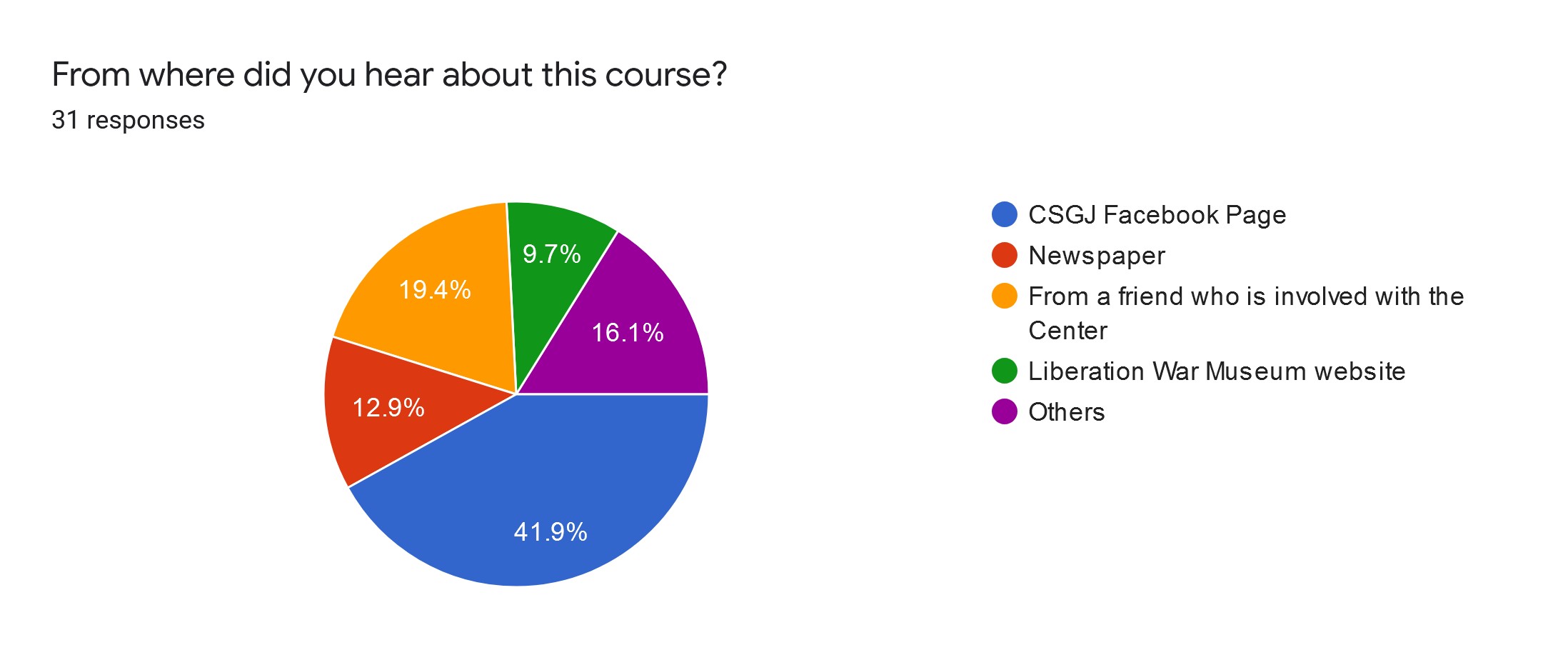 |
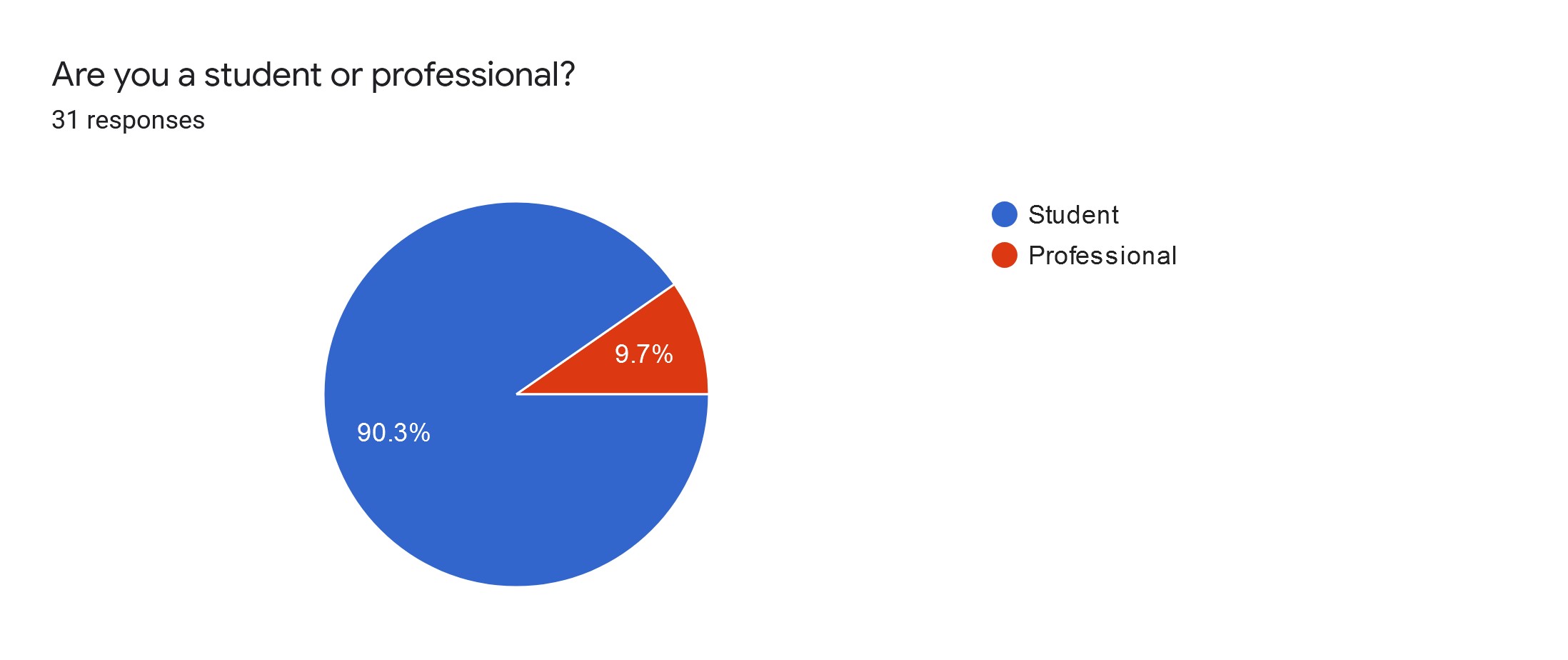 |
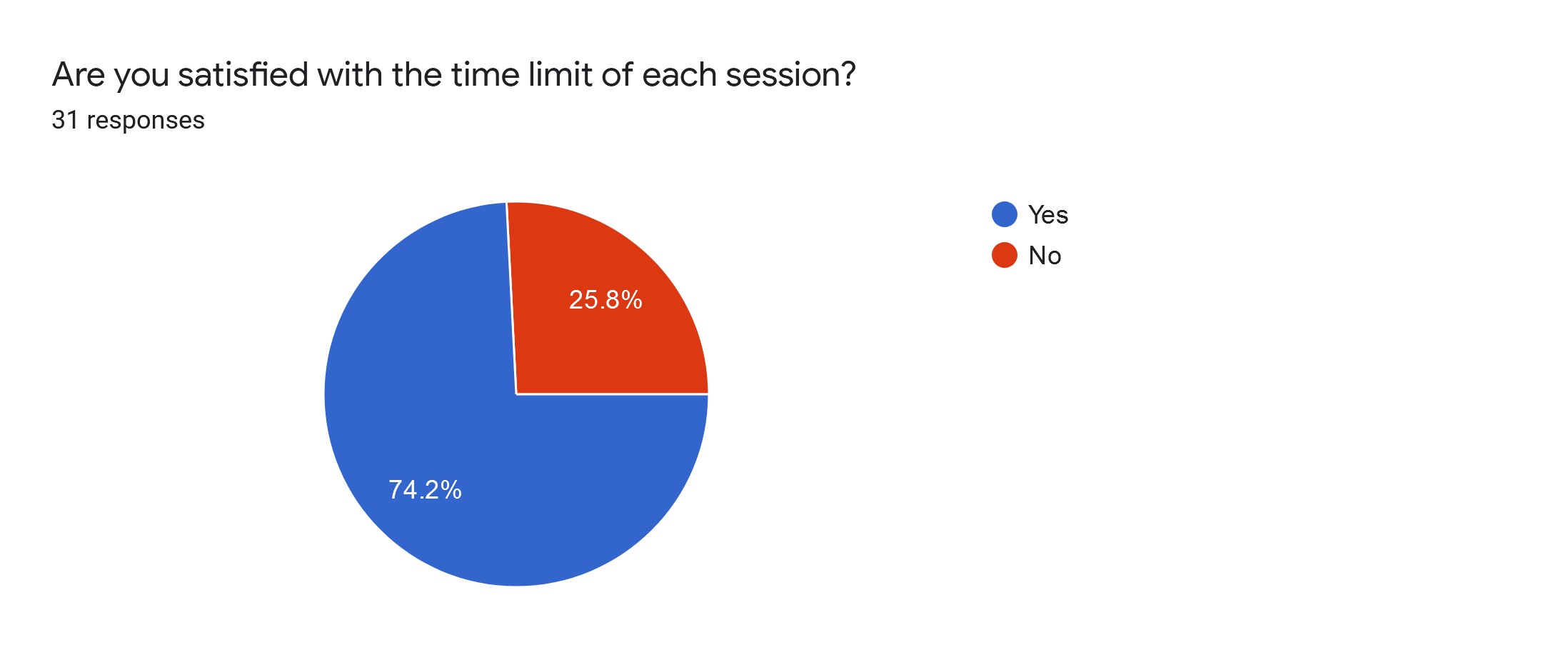 |
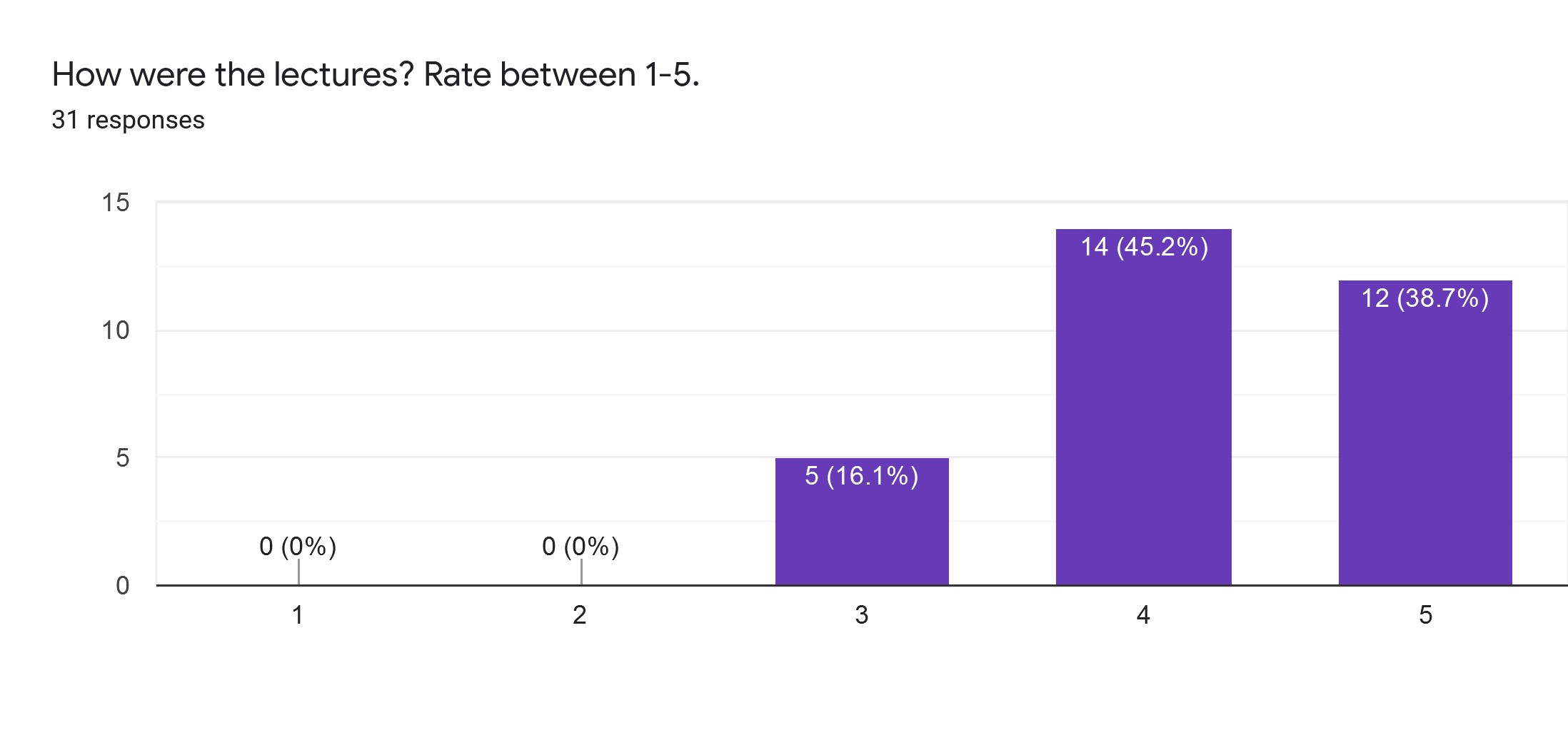 |
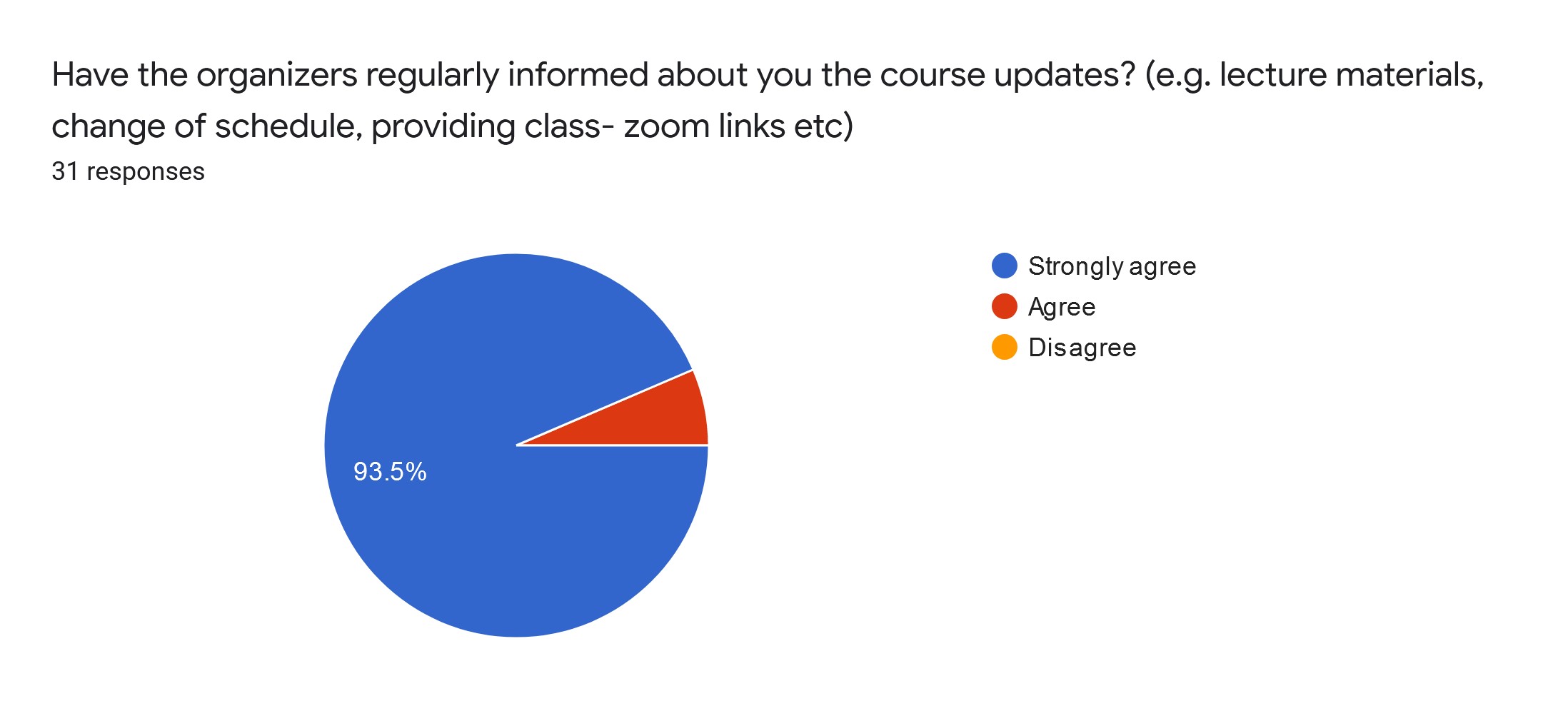 |
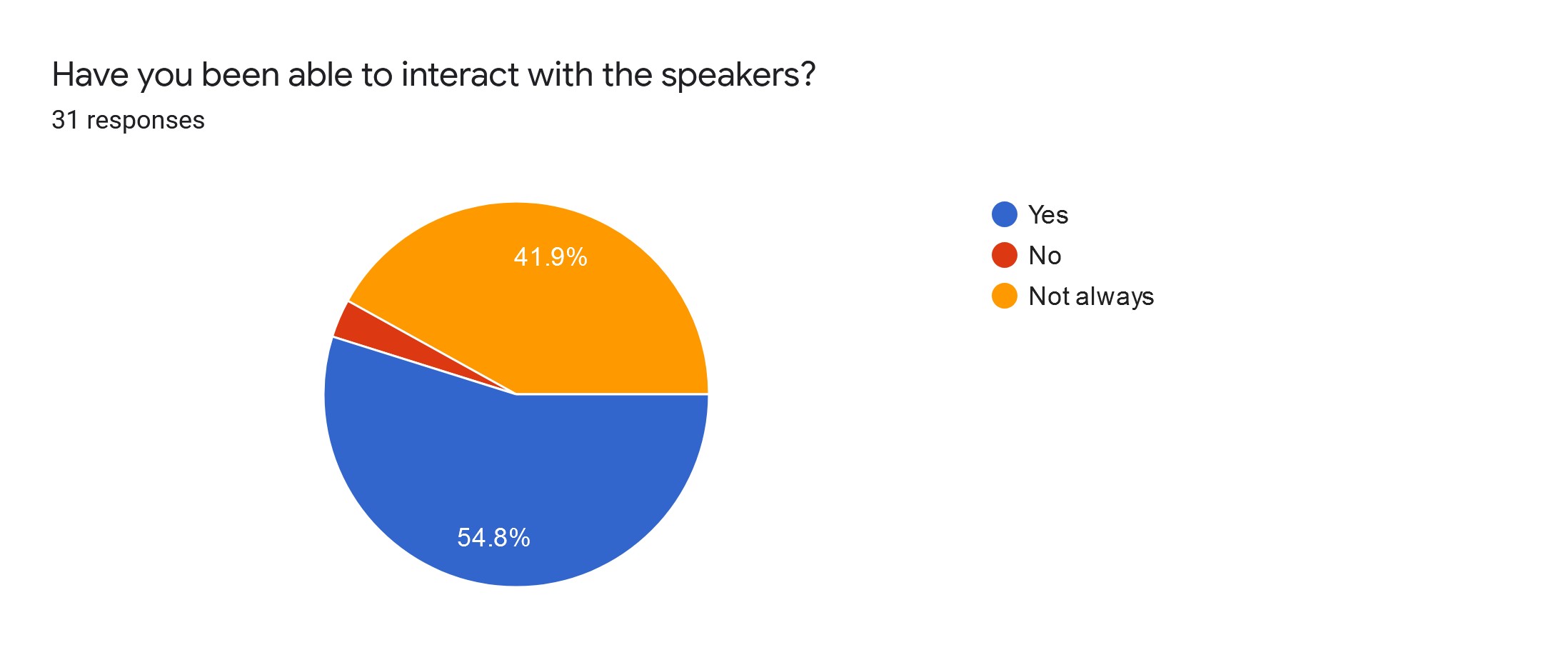 |
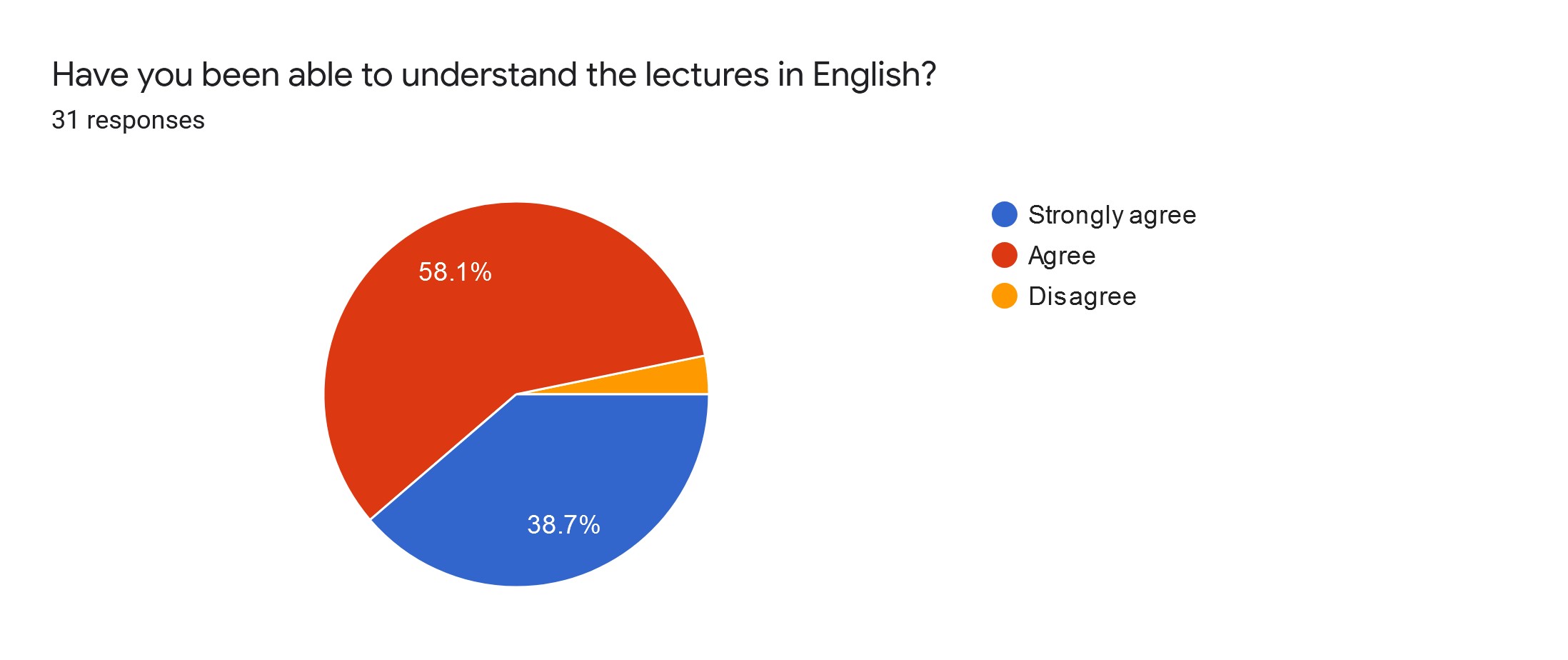 |
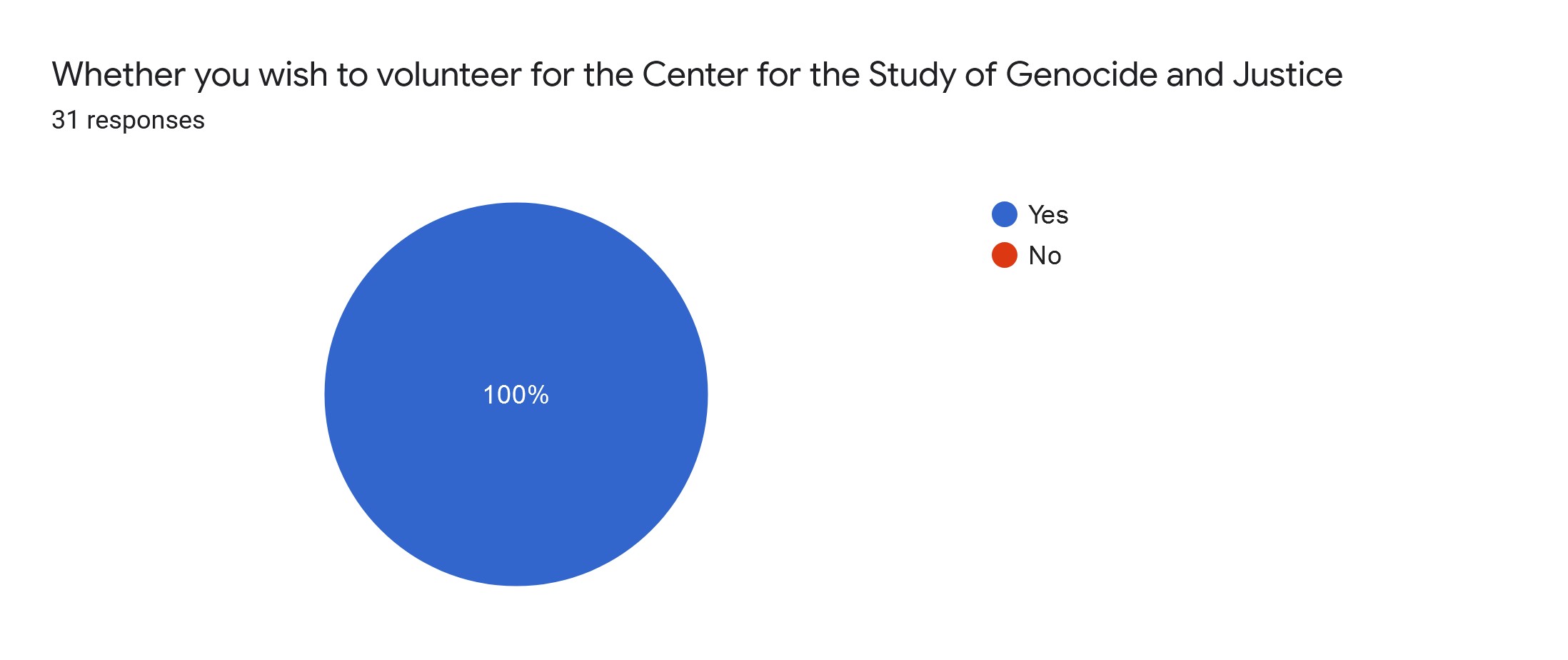 |
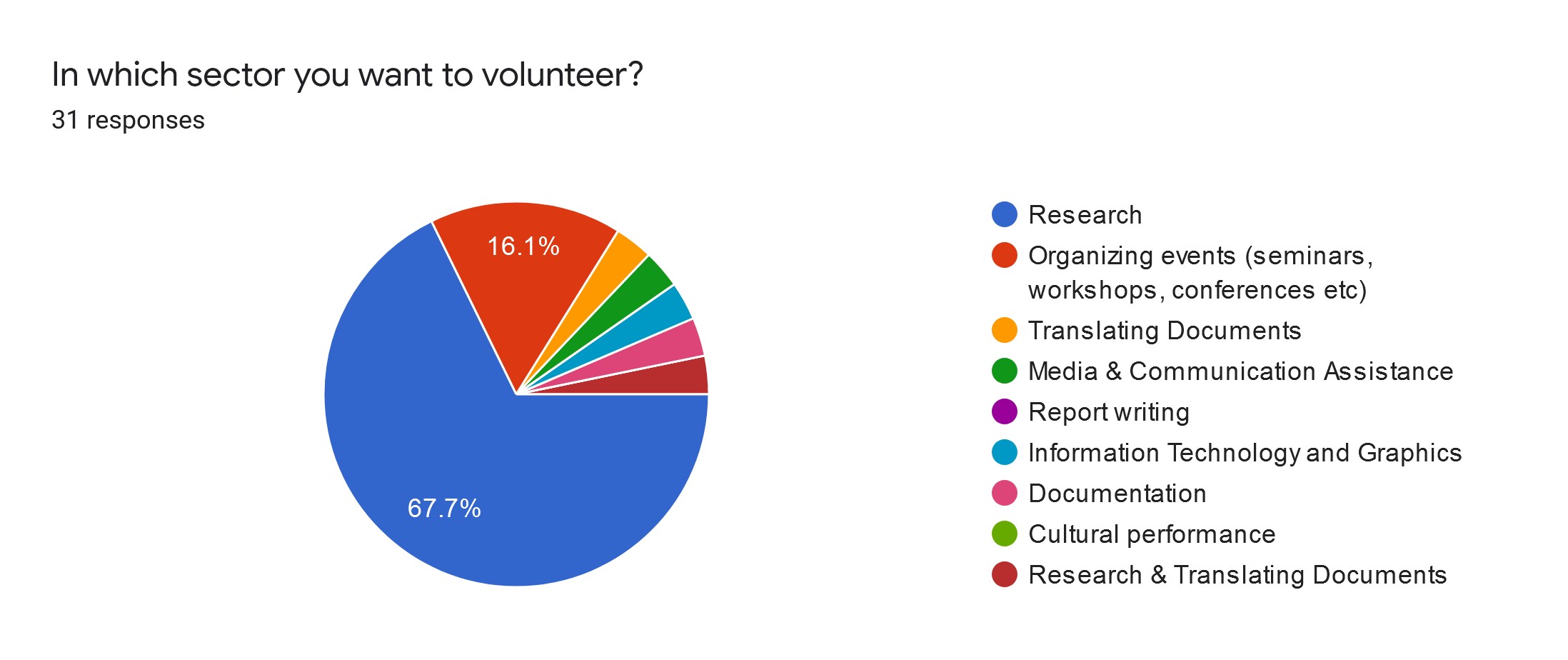 |
Participants Words:
Ommay Hani Sadia
The online certificate course on “Genocide and Justice” was planned in a very proper way. The speakers delivered their speech very nicely. The role of the moderator is praiseworthy. All the arrangements done and facilities given by this program were admirable. It would be better if the length of the classes could be extended a little more. This was a great opportunity to make the quarantine time very productive.
Md. Rahamatullah
I am fully satisfied about the online certificate course. All the people are more interactive and very polite. In the pandemic situation, I think this course was very suitable. The course schedule was comfortable. It was not interrupting my other academic activities. In my opinion, the course schedule was perfect. I am so lucky because I had an opportunity to interact and gain knowledge from renowned national and international scholars. They were very wisdom and experienced in those sectors. They were very interactive with the students. They were trying their best to offer their insightful knowledge with us. The moderator was so helpful and very abuzz for integrant to her duties. She was very time sensible. The length of the class was also consummate. Within this time, I think if anyone wants to gather knowledge and make him sagacity, then he can. Overall, all the facilities course schedule, moderators, teaching approach, and the speakers were thorough.
Md. Rahul Hasan Joy
As a participant of this course, it was a new experience for me sharing the same platform with the most intellectual personalities from home and abroad. I would like to thank CSGJ for organizing this online course on Genocide & Justice and for conducting all the lecture sessions with due attention. I must acknowledge the fact that the Moderator (Naureen Rahim) played a key role in making the course successful for us. It’s worth mentioning that all the distinguished speakers from home and abroad tried level best to provide us straightforward understanding on Genocide and Justice system, Genocidal History, Development of International Criminal law etc. both from domestic and International perspectives. I believe all the speakers utilized proper use of time during the lecture sessions & i must appreciate CSGJ for creating this platform & taking commendable initiatives during this covid-19 pandemic. I am really grateful to this centre for giving me a new experience together with the finest learning schedules.
Nidhi Chakma
My overall experience in this Online Certificate Course is good. The schedule is perfect as the classes are held in the weekend and in the holidays which encourage people with time management difficulties. I appreciate the punctuality that you have shown while starting the classes on time. I enjoyed learning from the speakers around the world who are experts in their respective fields. Moderators were helpful too while communicating with the guest lecturers. The length of the classes was perfect but it could have been better if we have got a little bit more time for discussions. Considering the facilities, I did not face much technical issues except the load shedding.
2nd Online Certificate Course on Genocide and Justice
After receiving a huge response on 1st online certificate course, the Center has organized its 2nd Online Certificate Course on Genocide and Justice. From 05 to 28 November 2020, the CSGJ has trained its 37 participants through renowned academics, experts and activists. Md. Salahuddin Saimum from Department of Law, University of Rajshahi has received the Best Participant Award for his overall performance and dedication towards the course. After the successful completion of the course, the participants jointly prepared a Declaration of Intent to provide their insights, expectation and further engagements.
